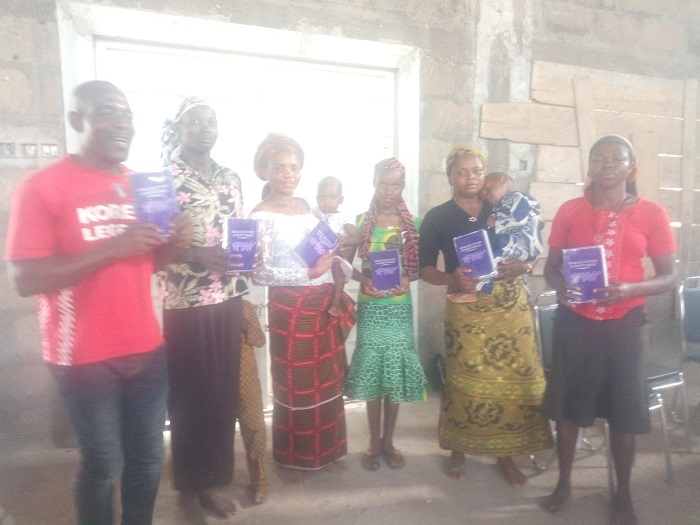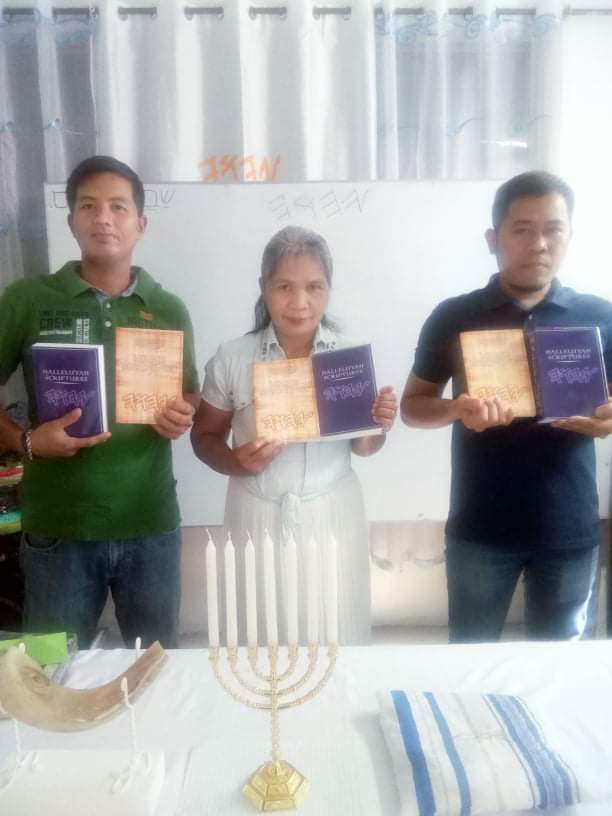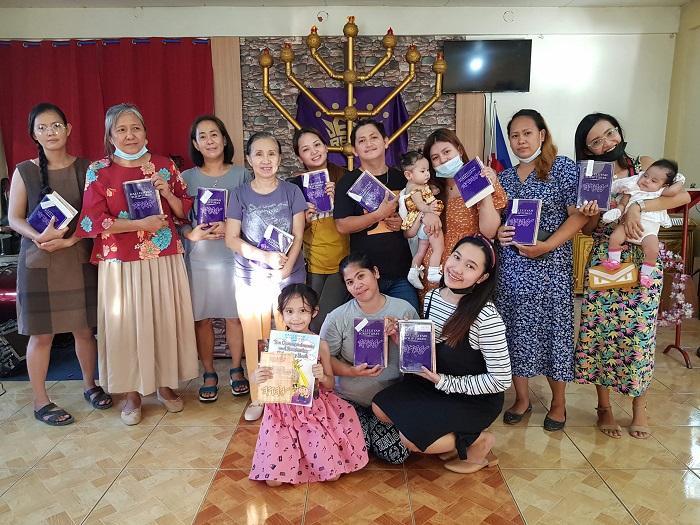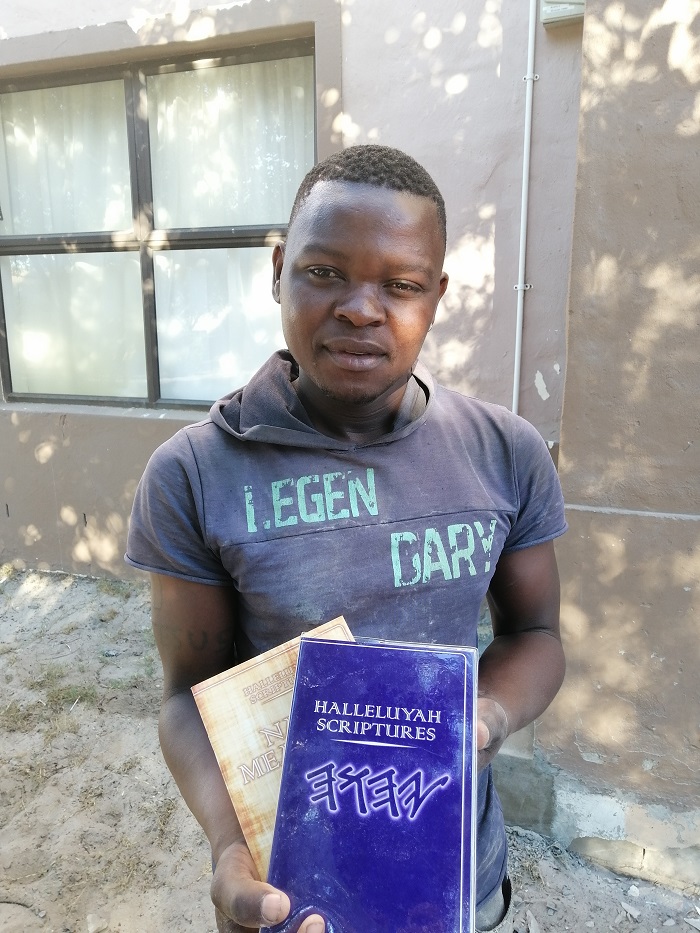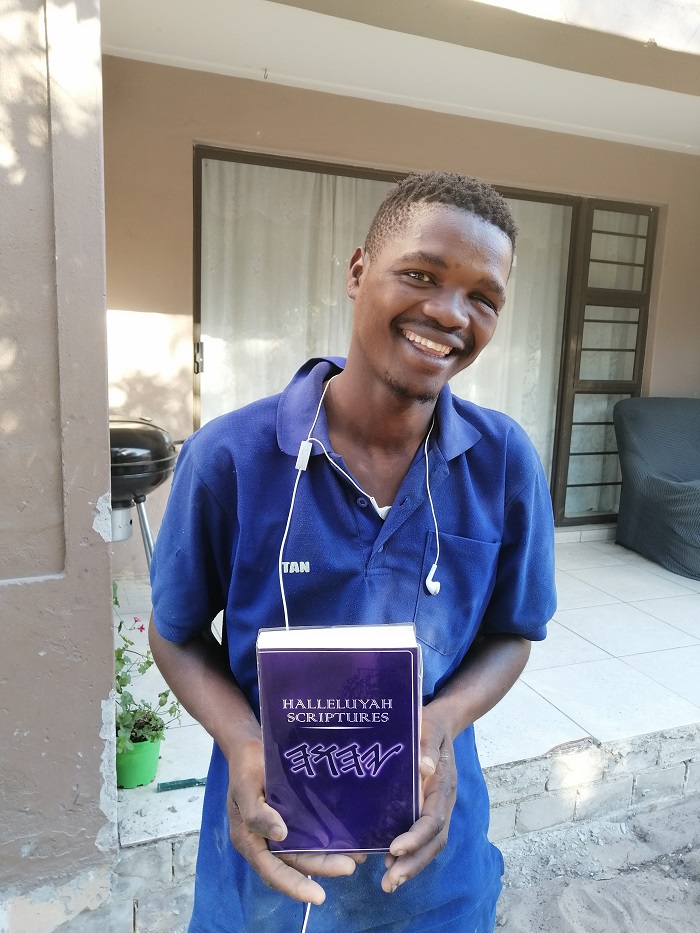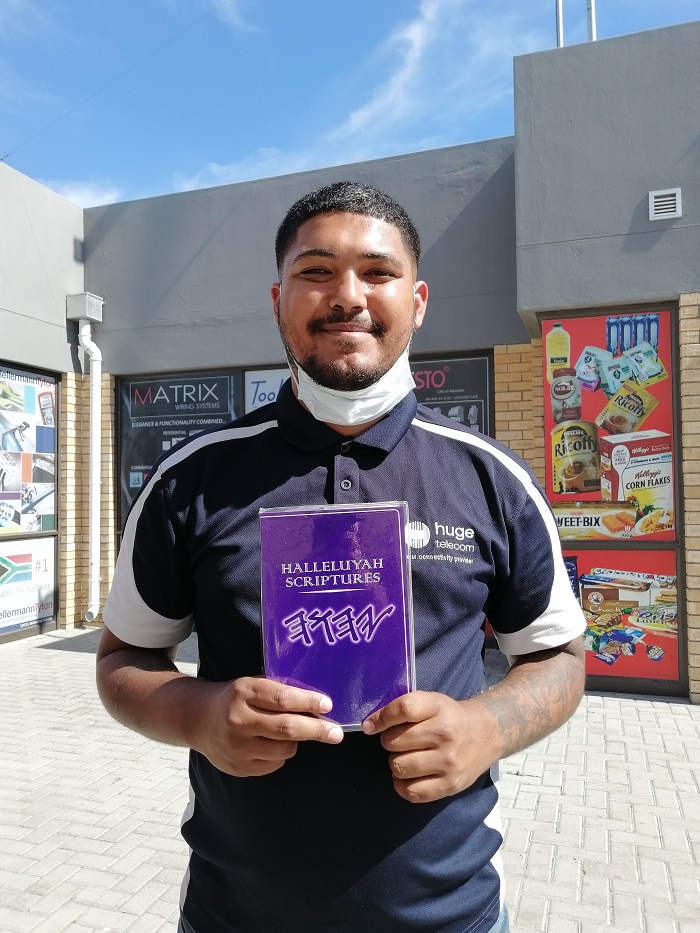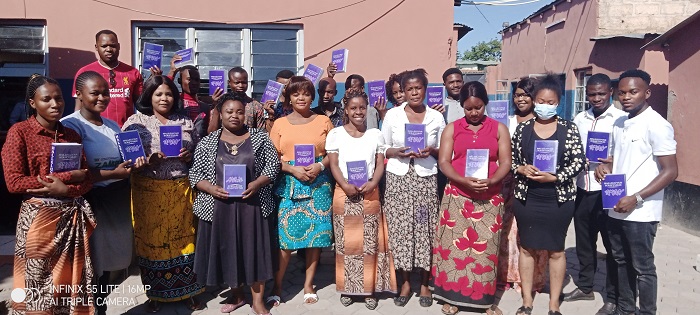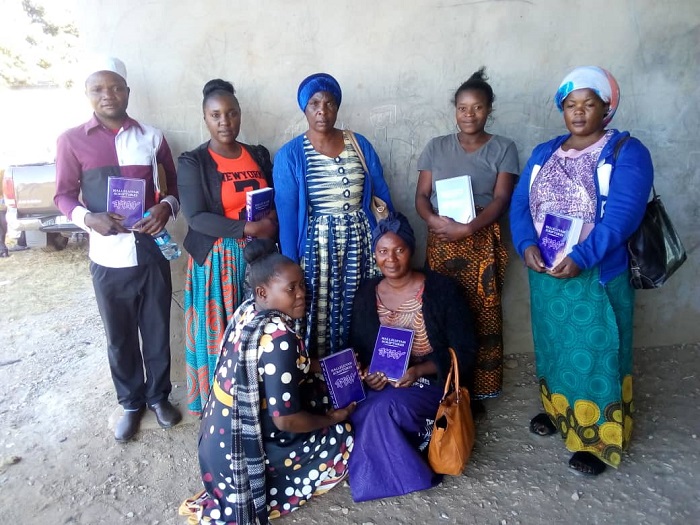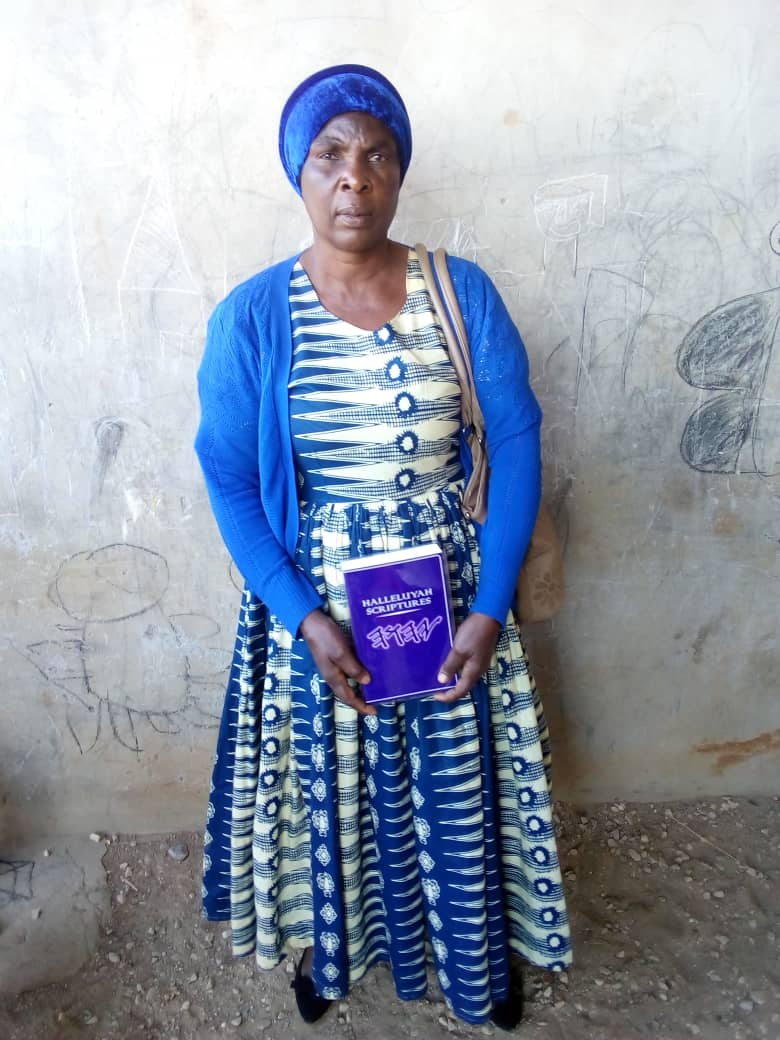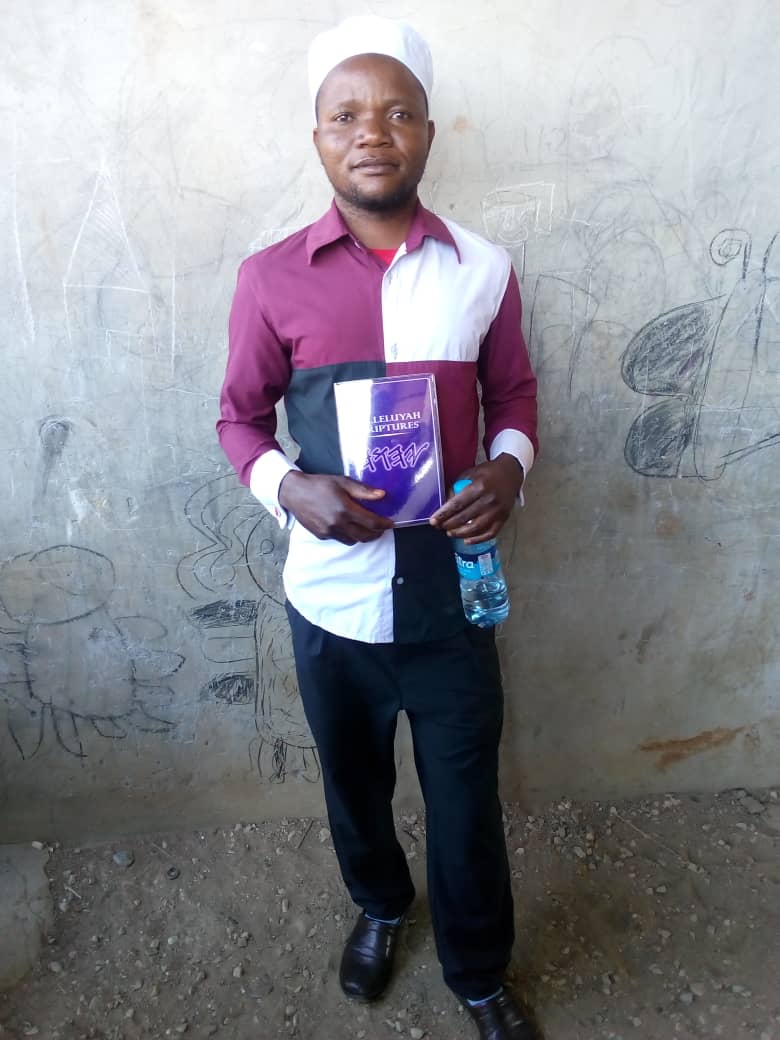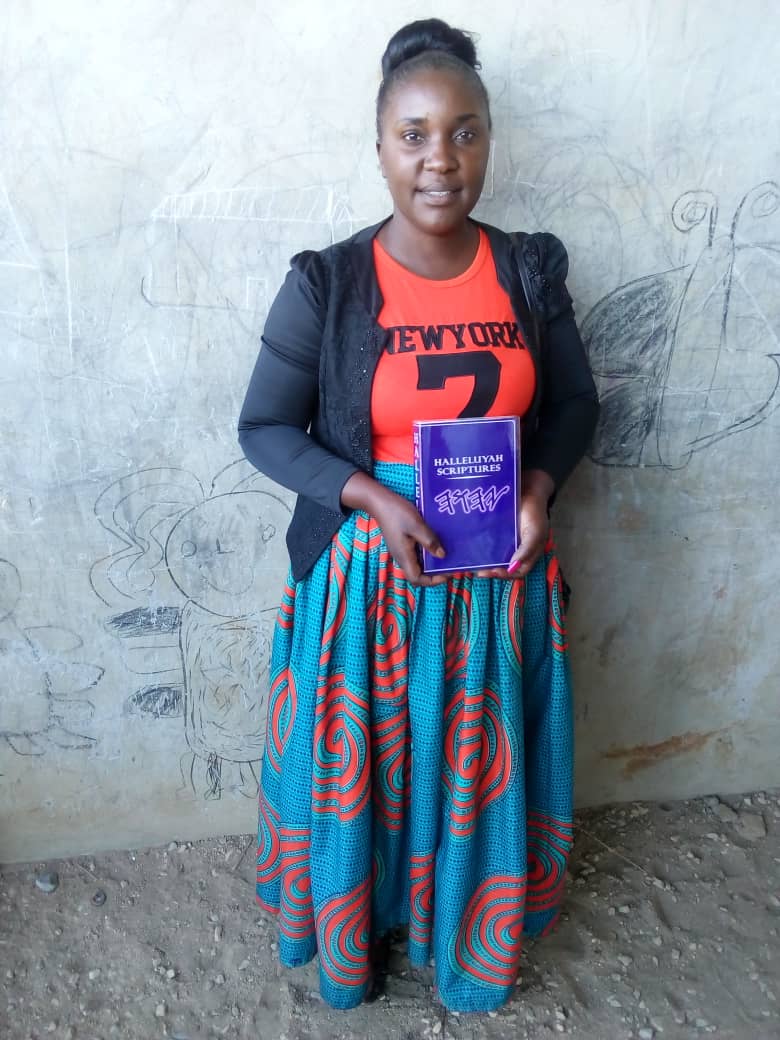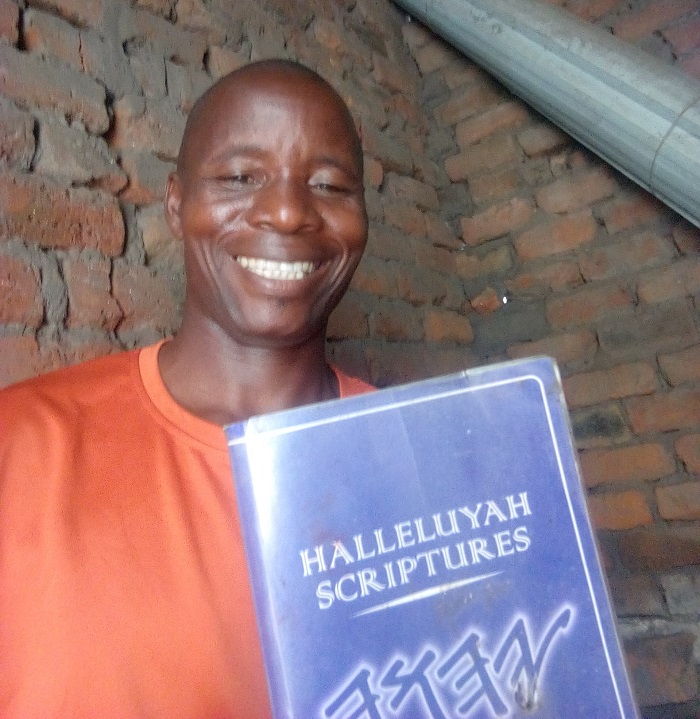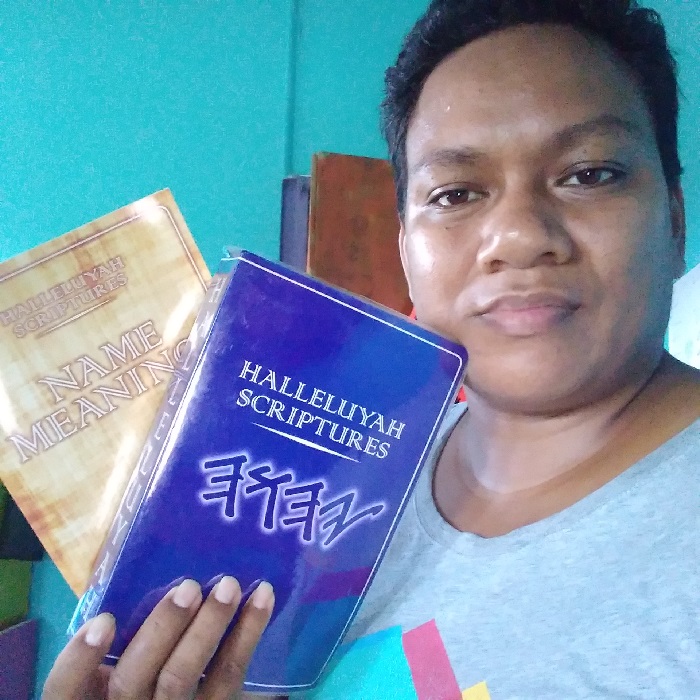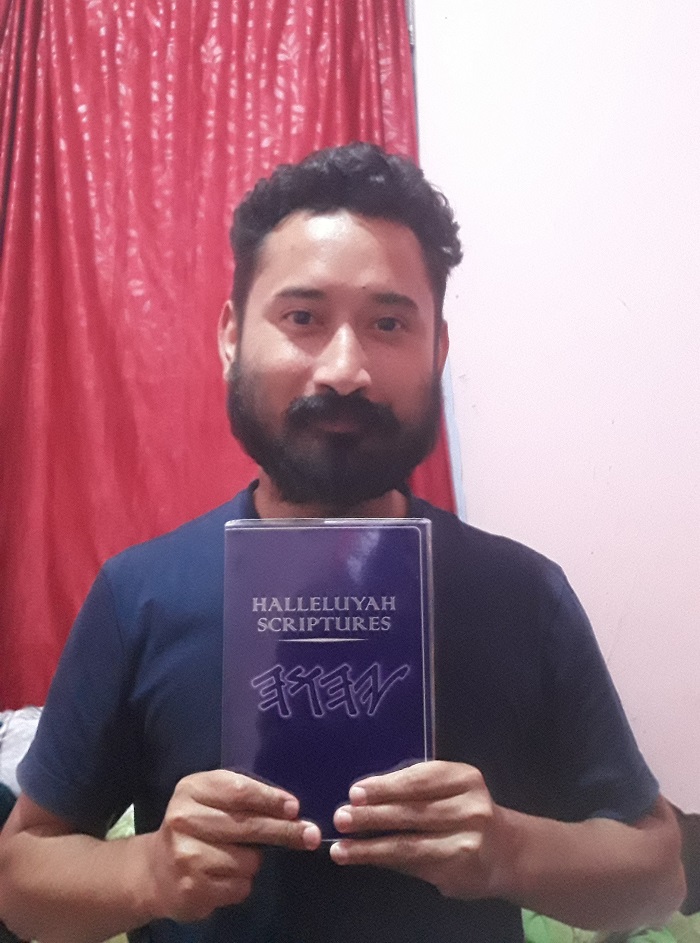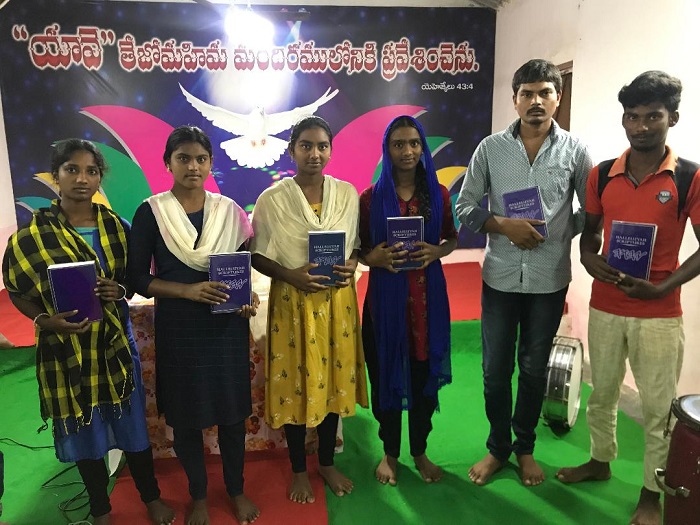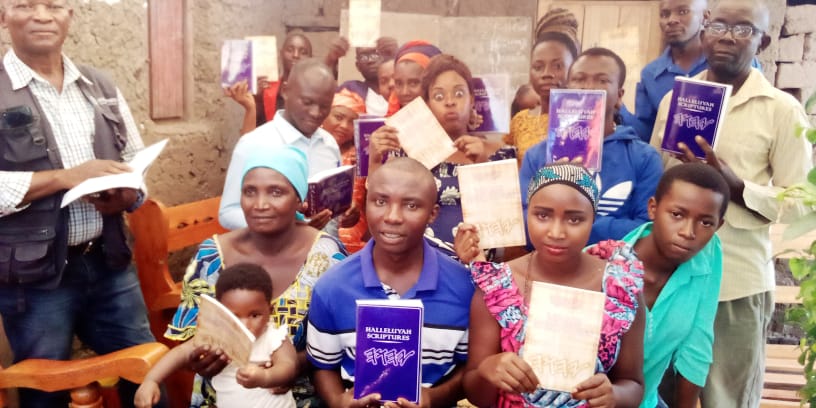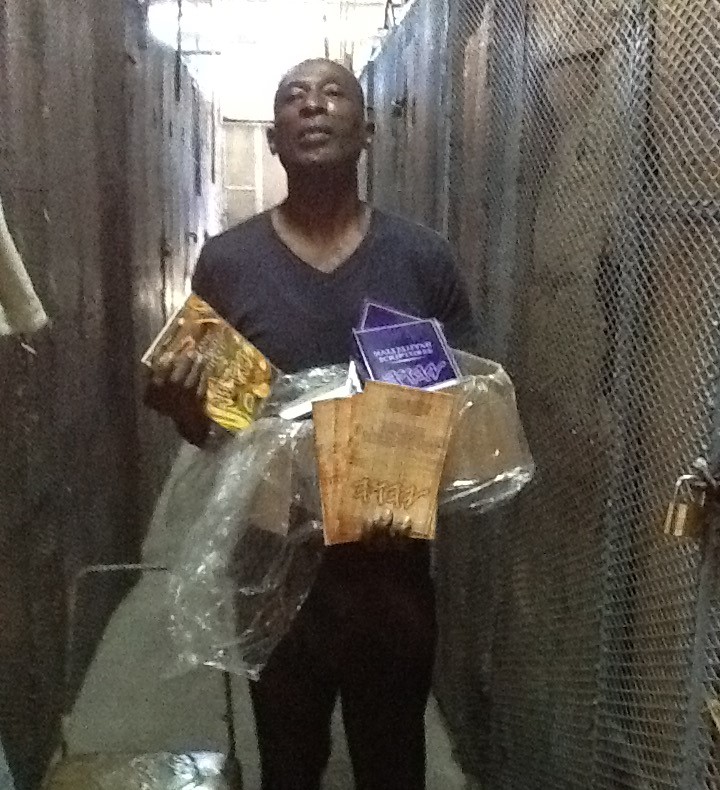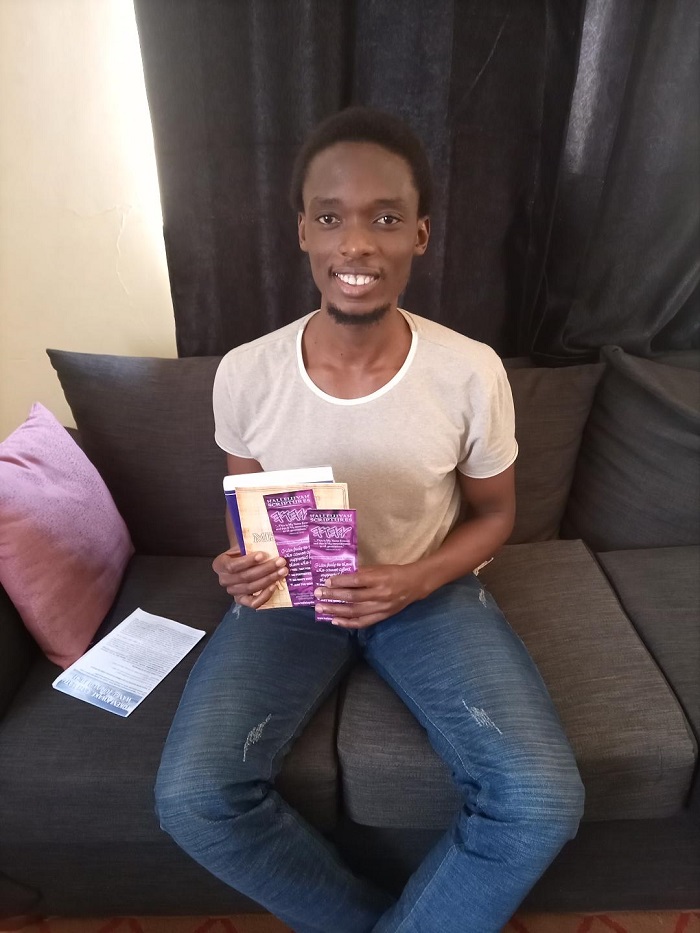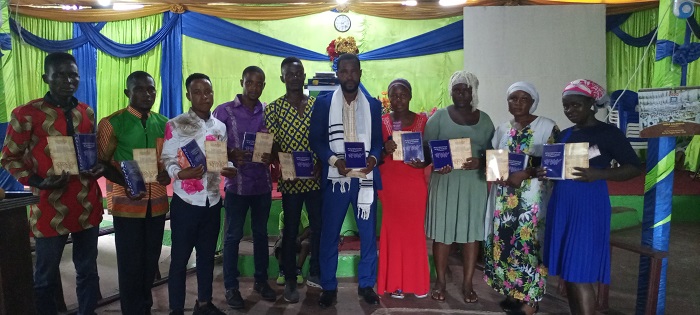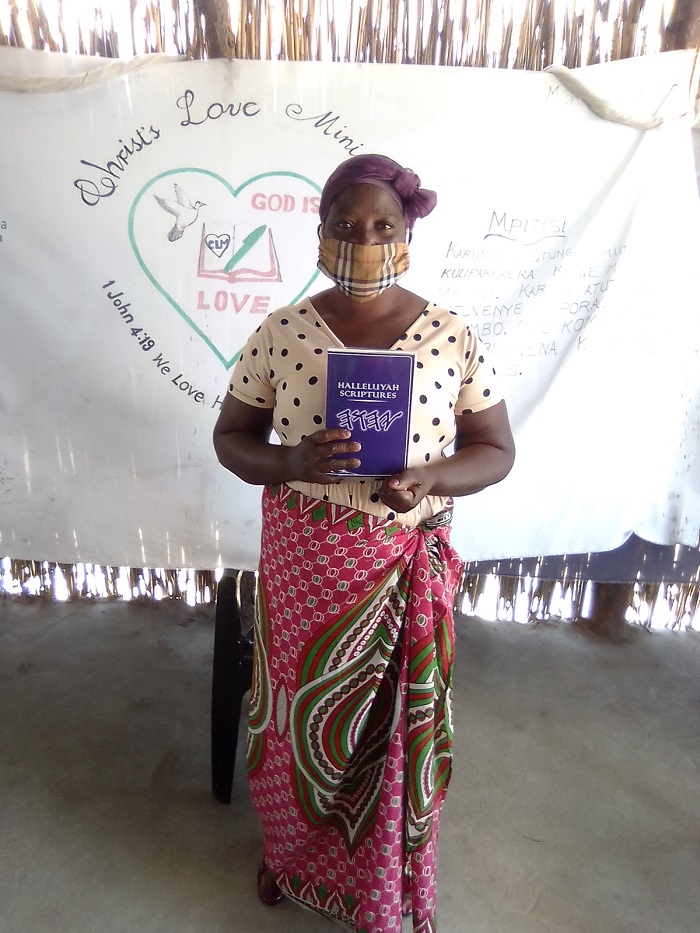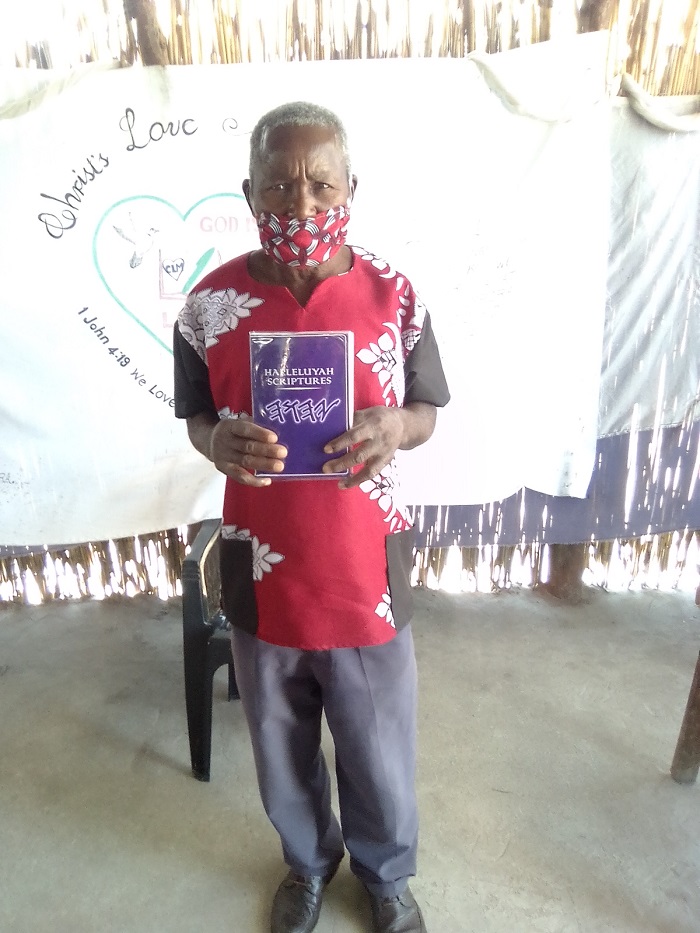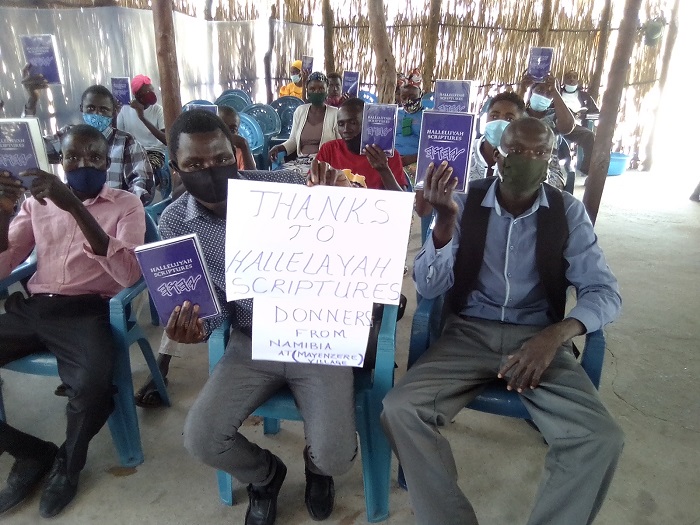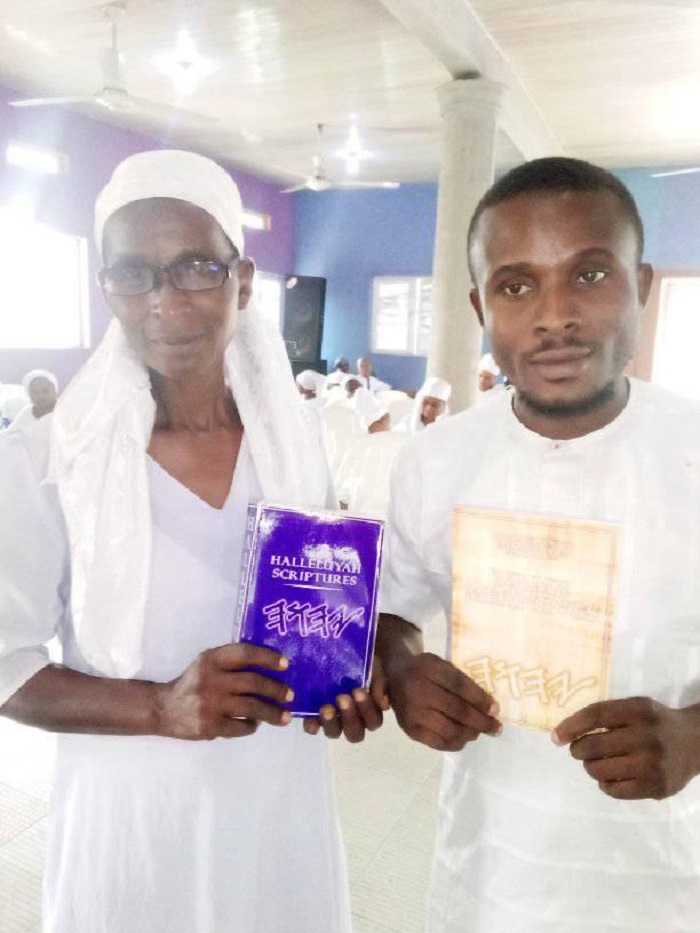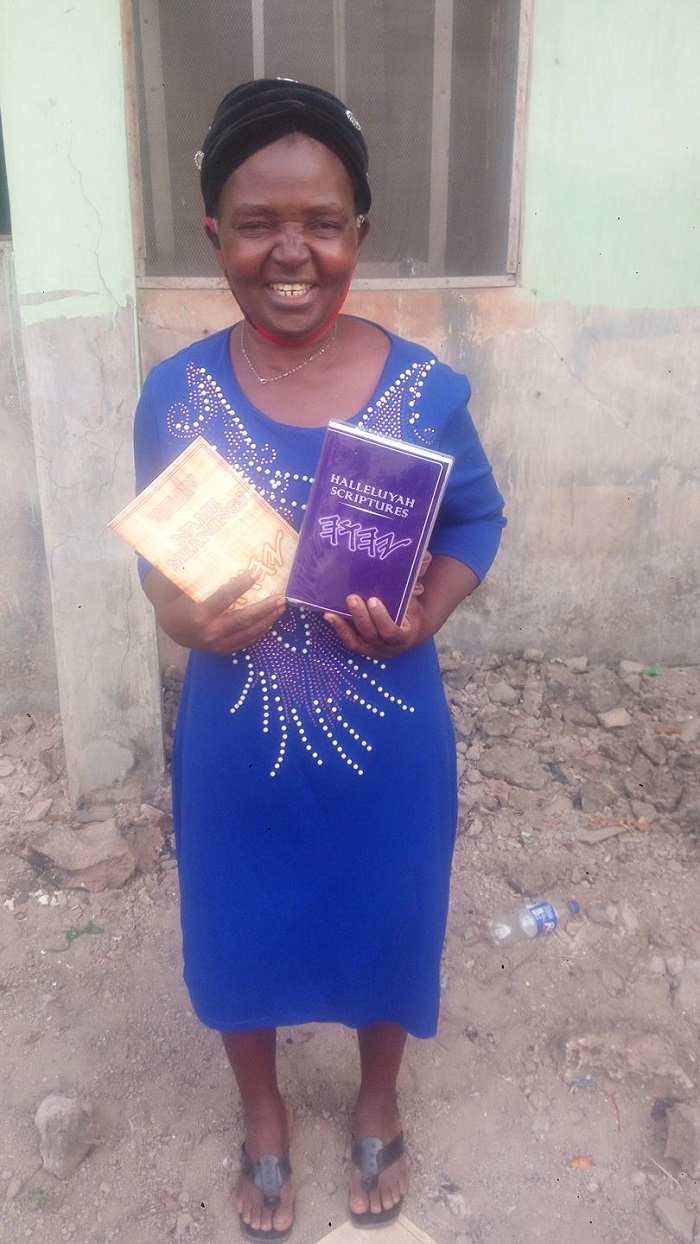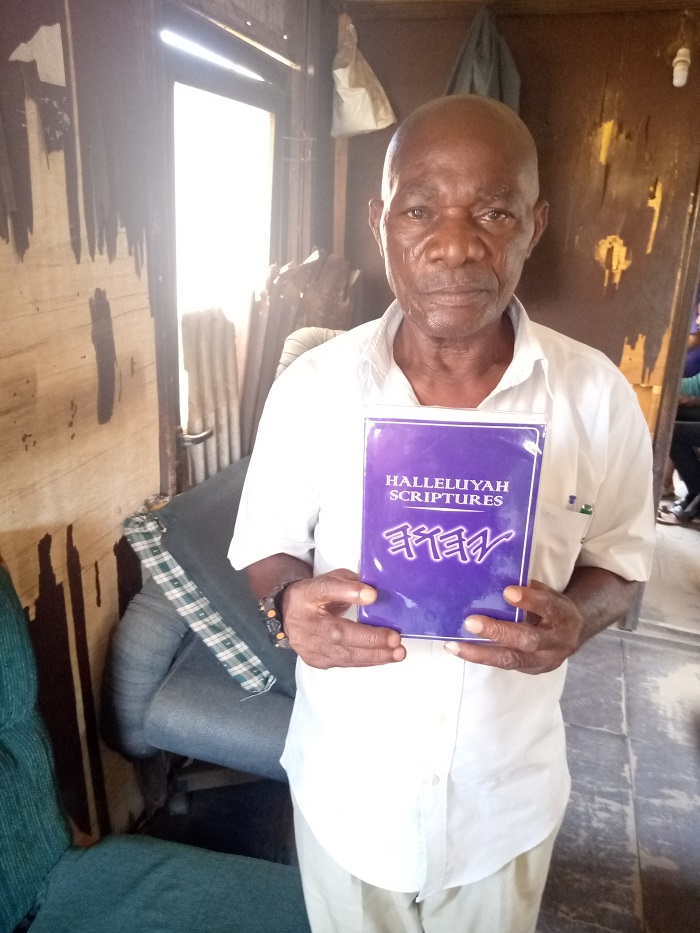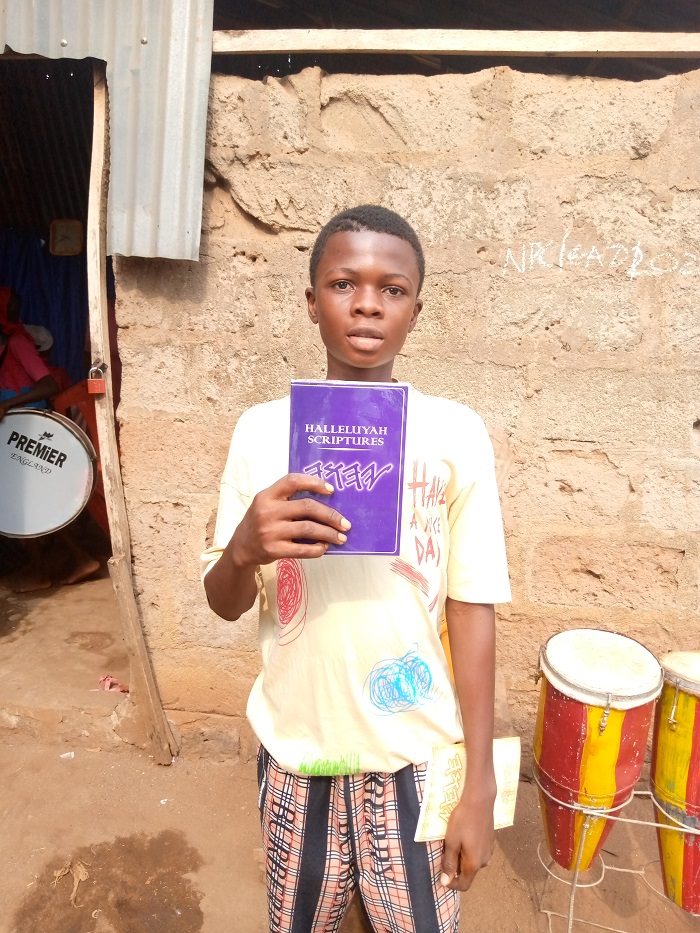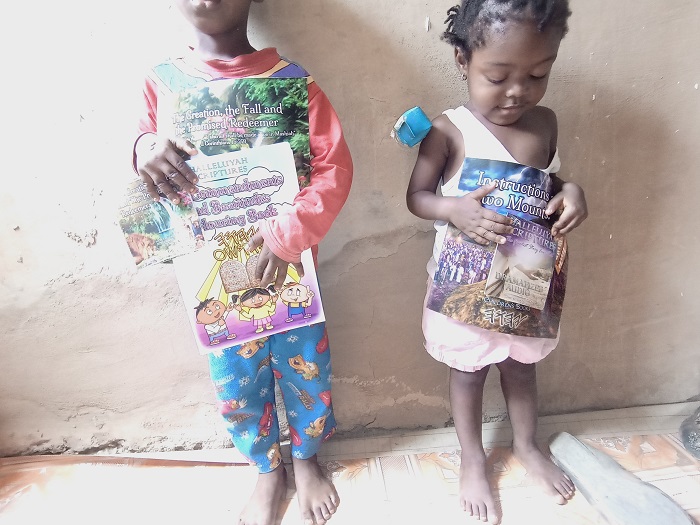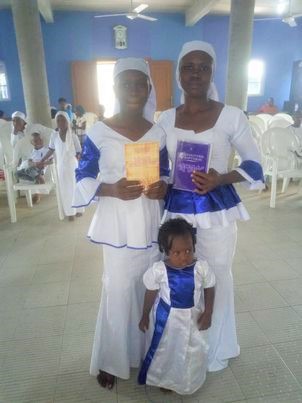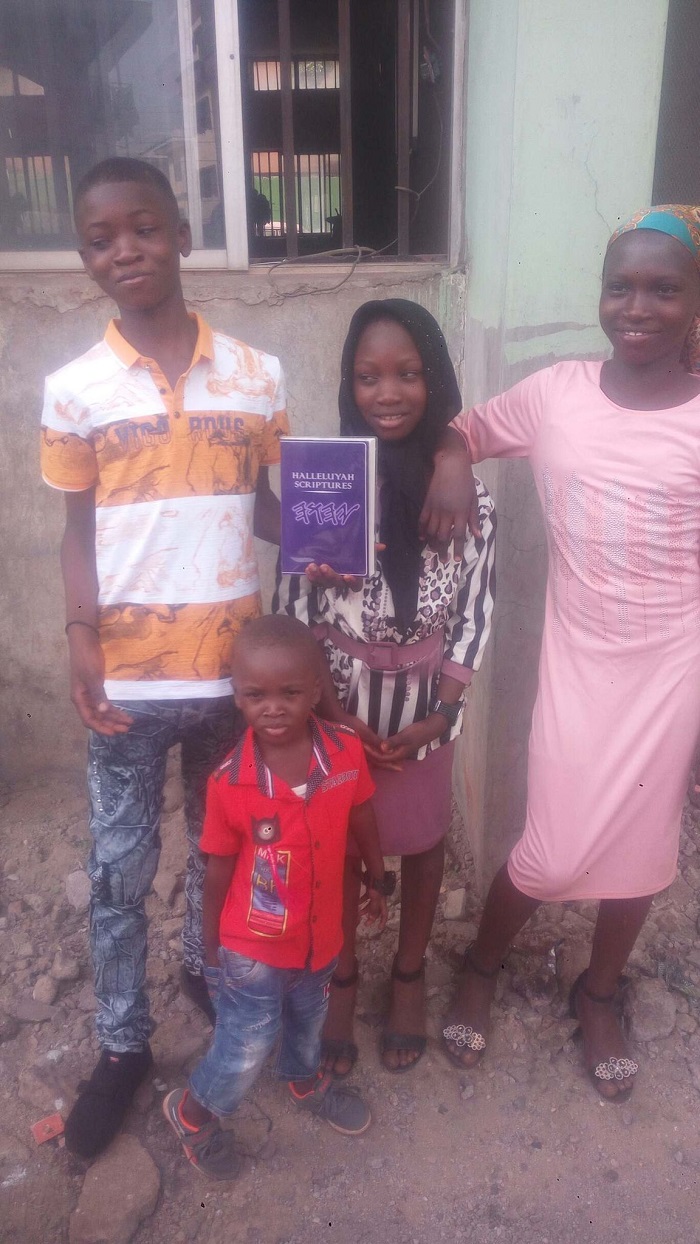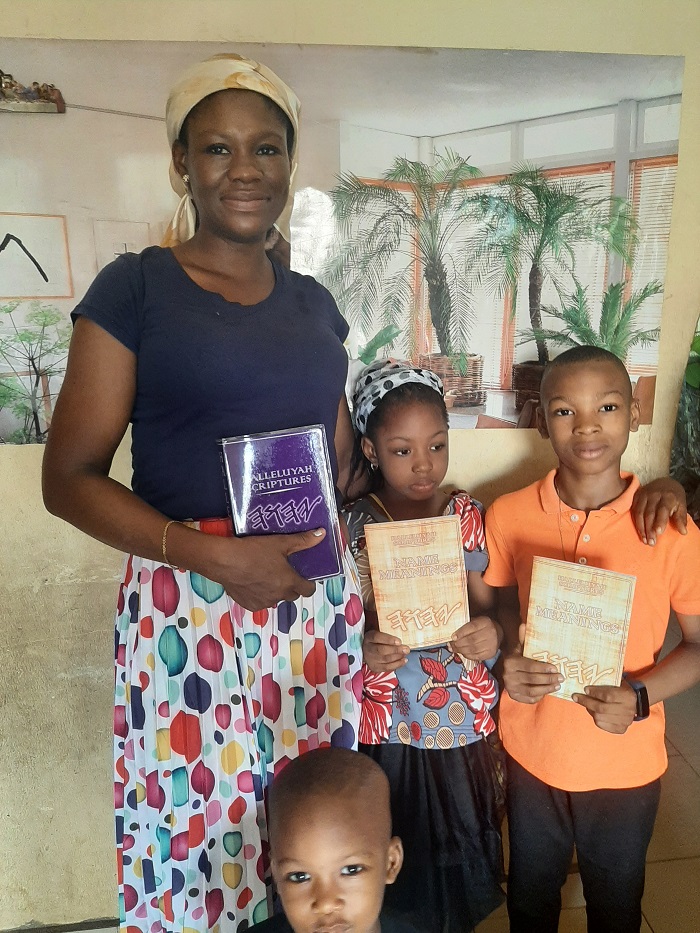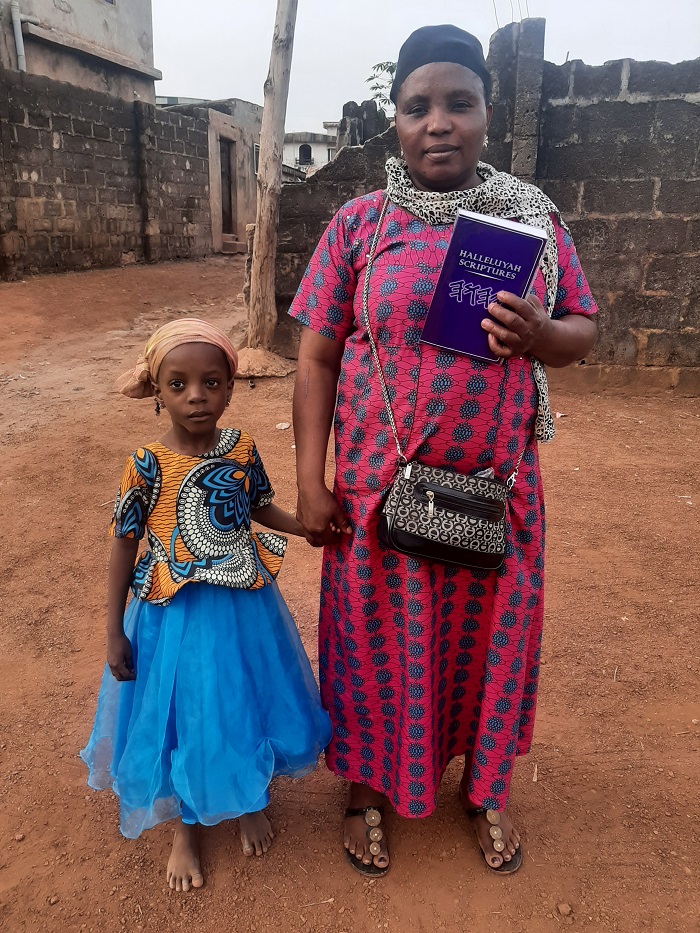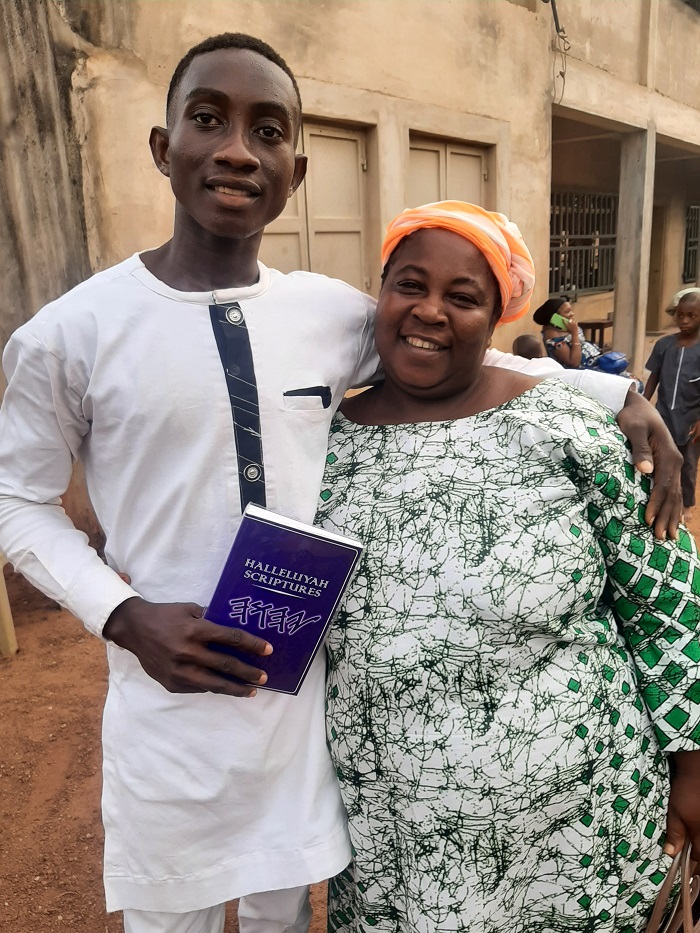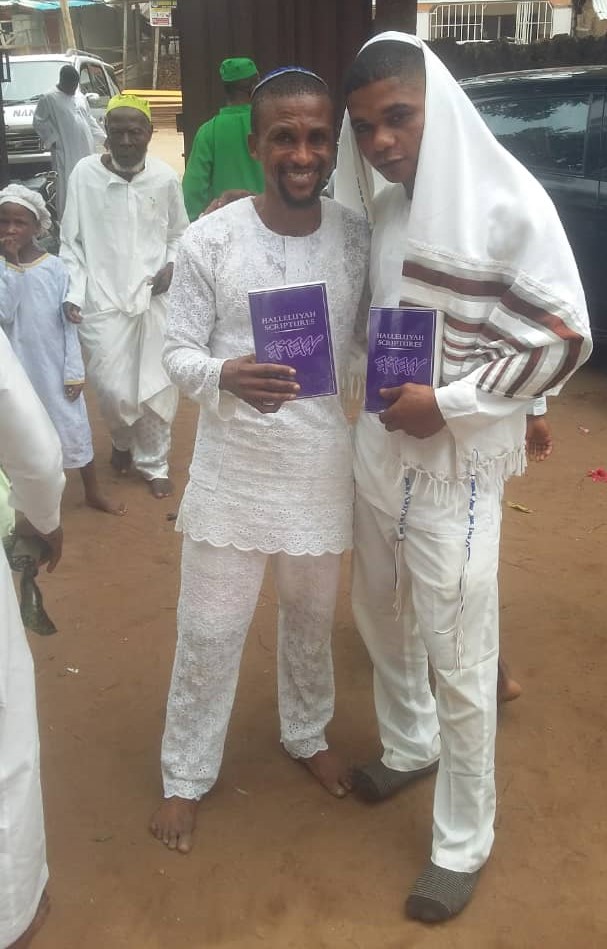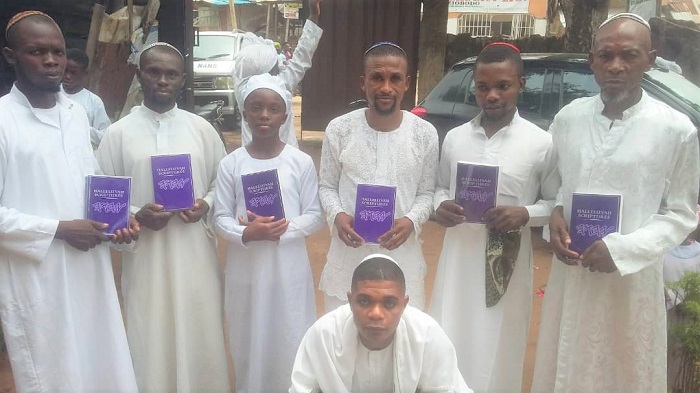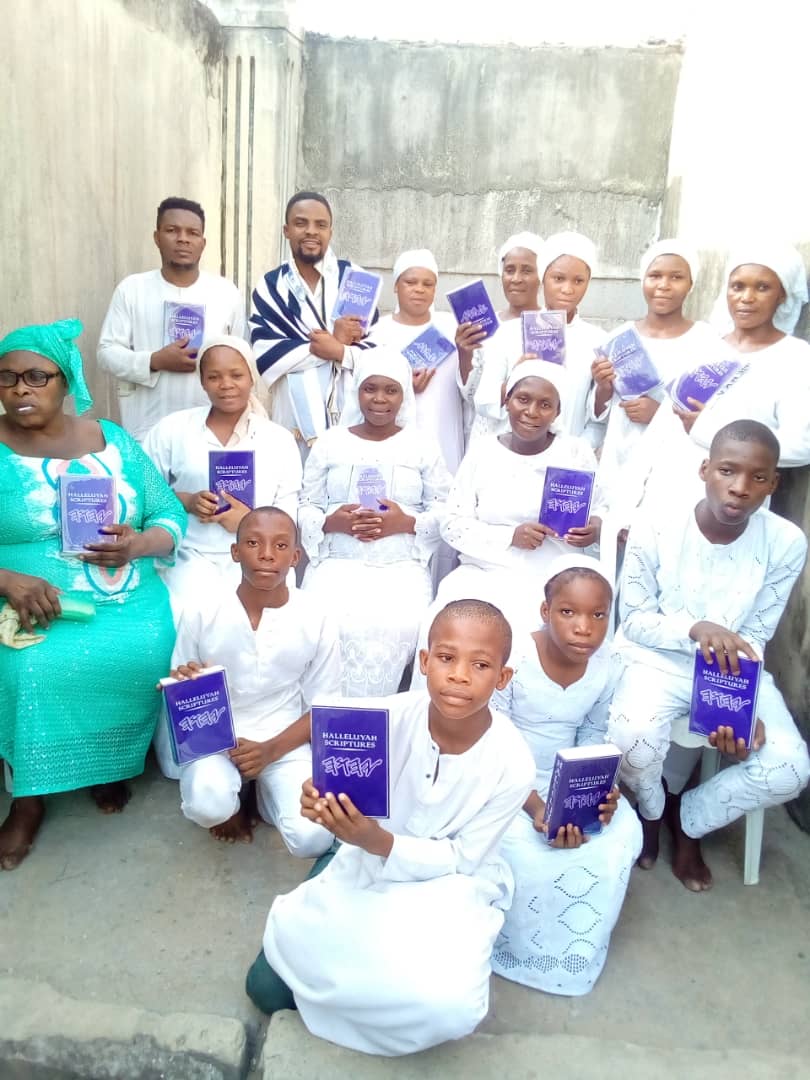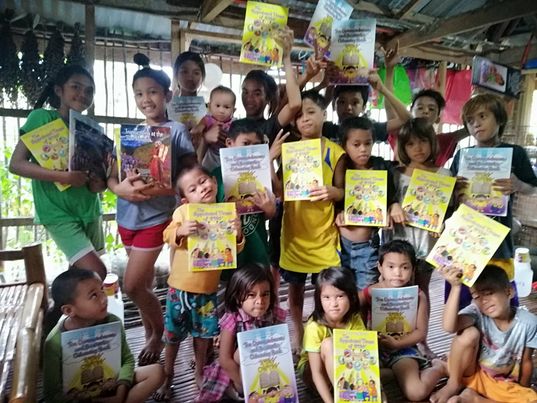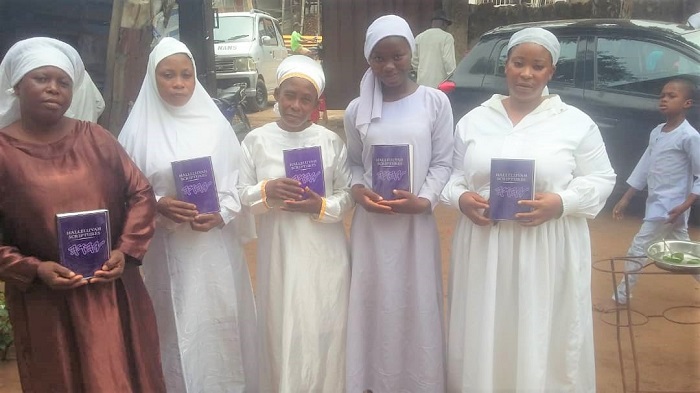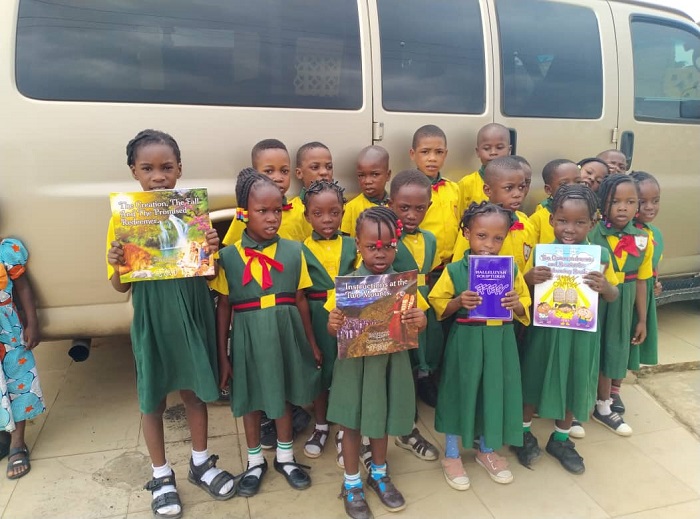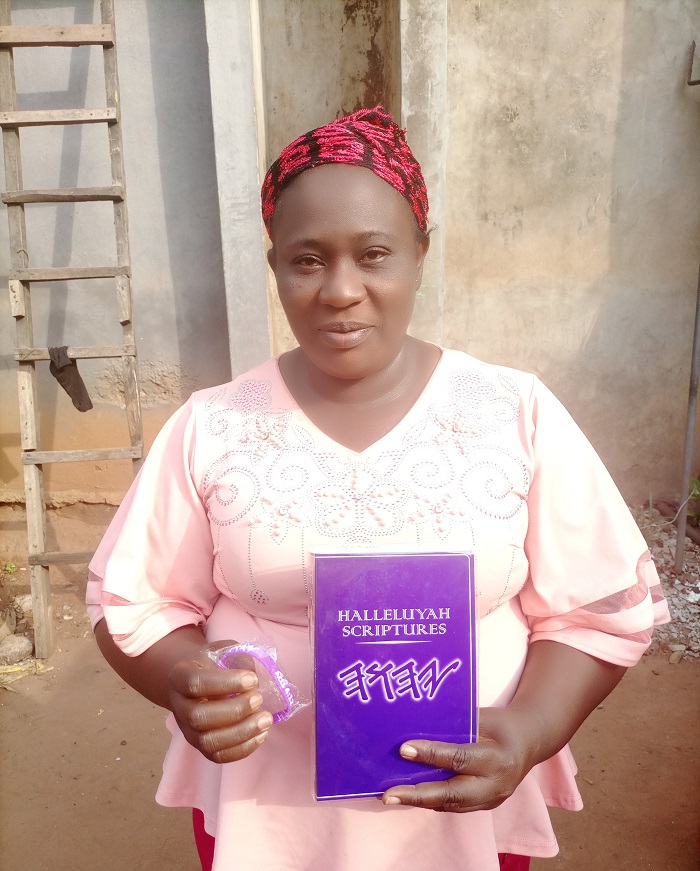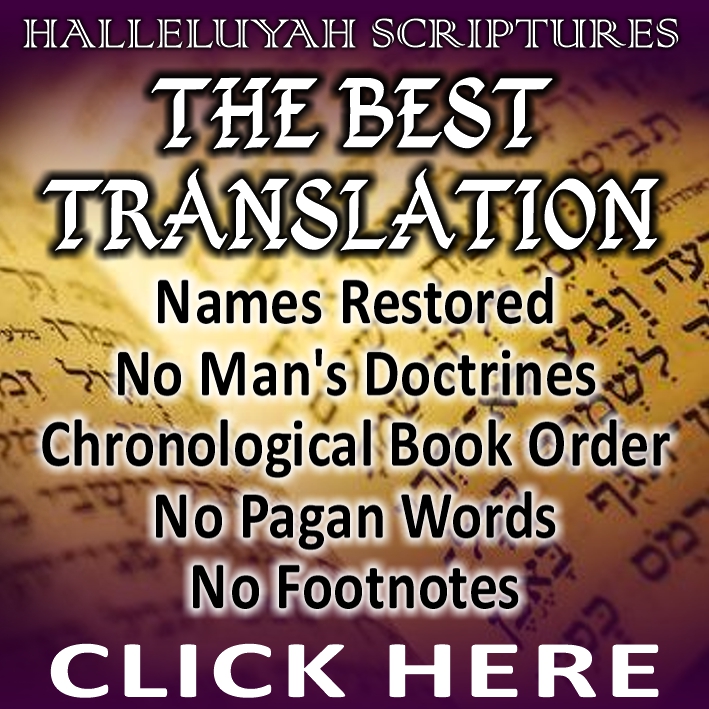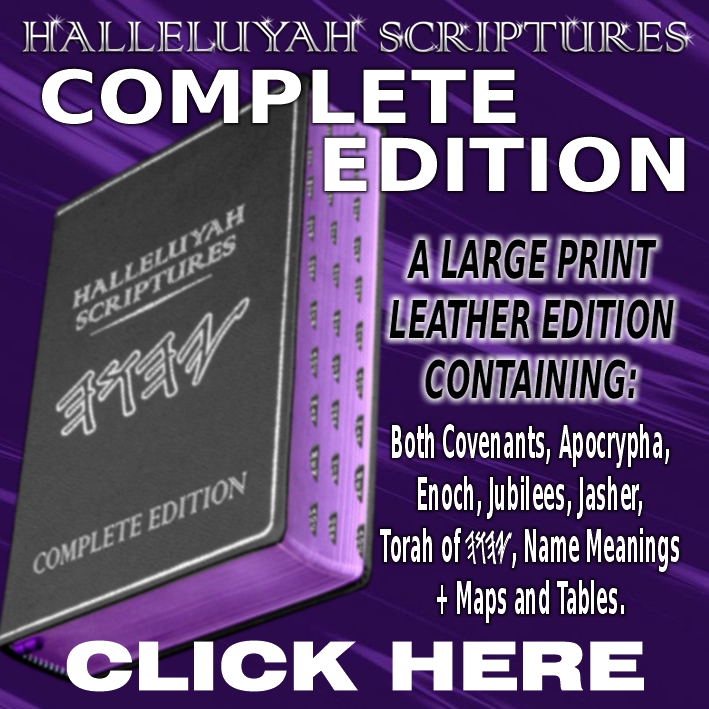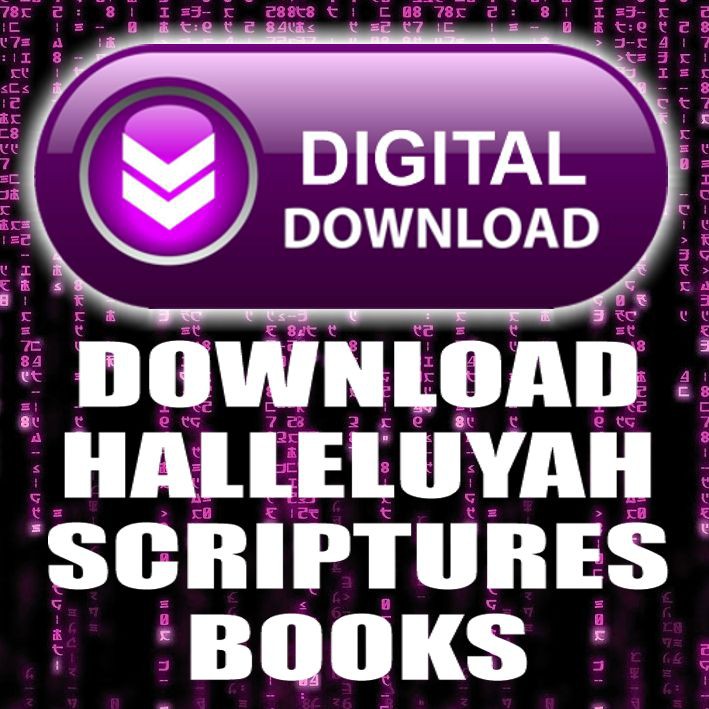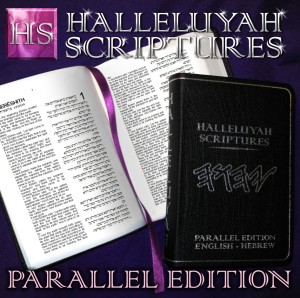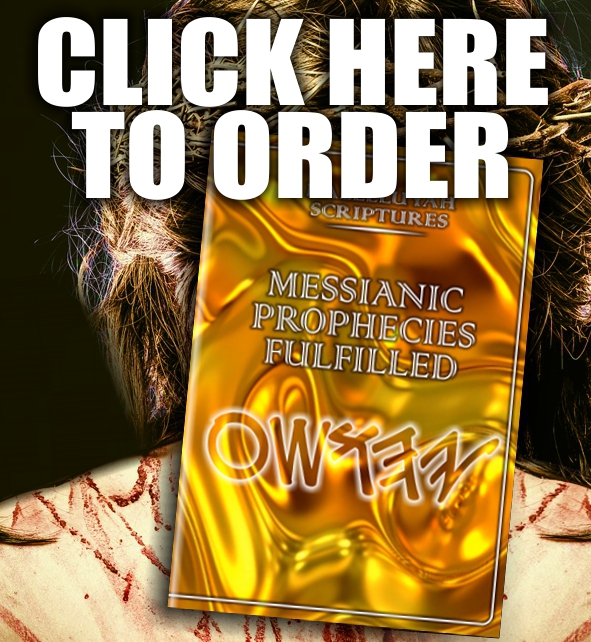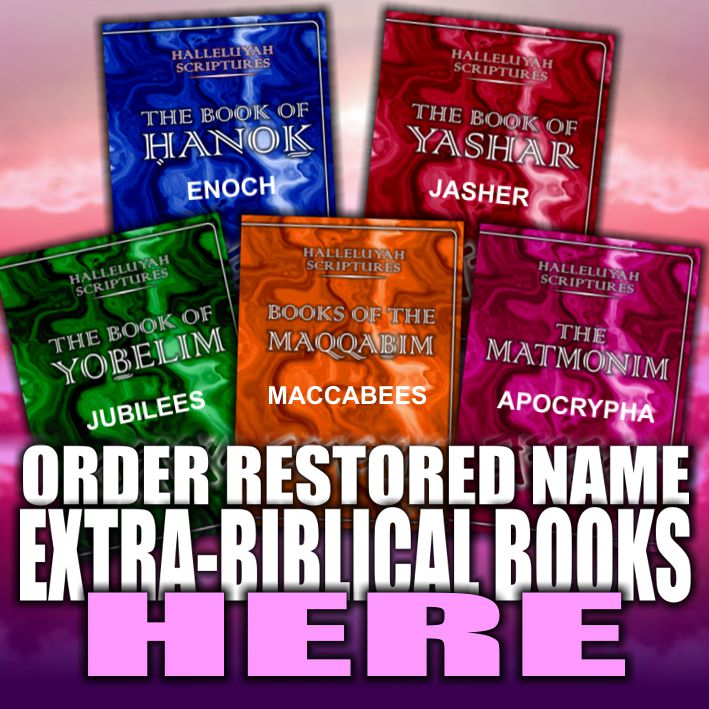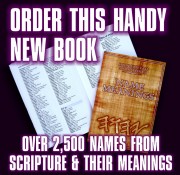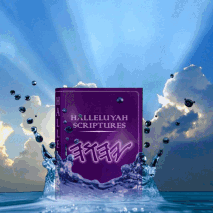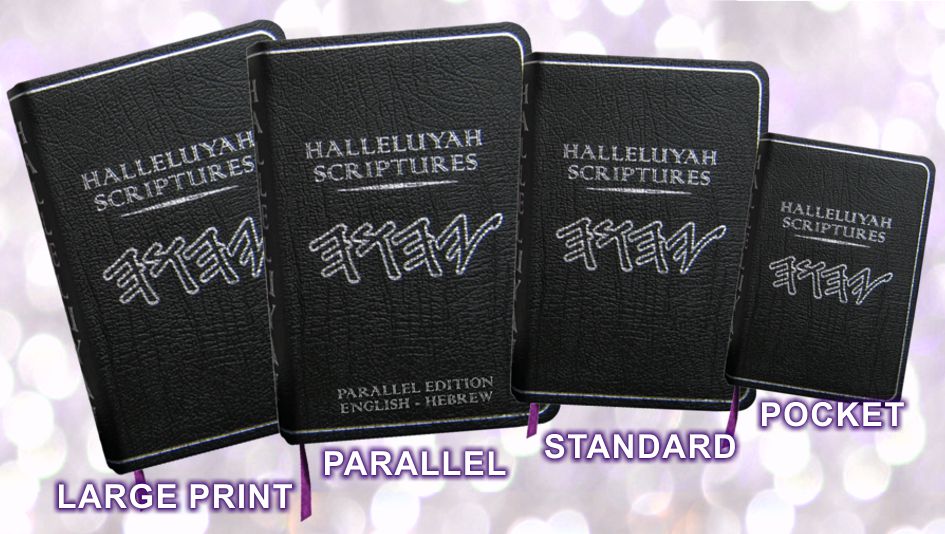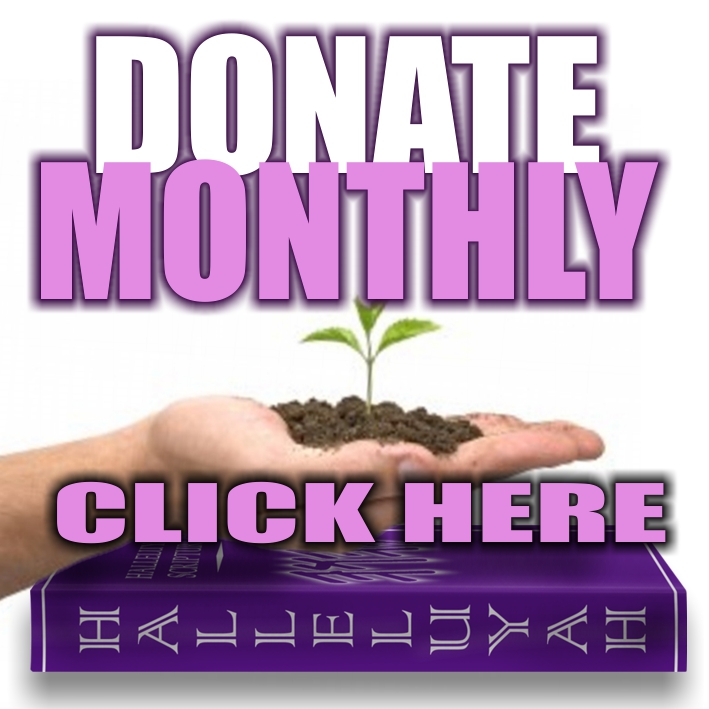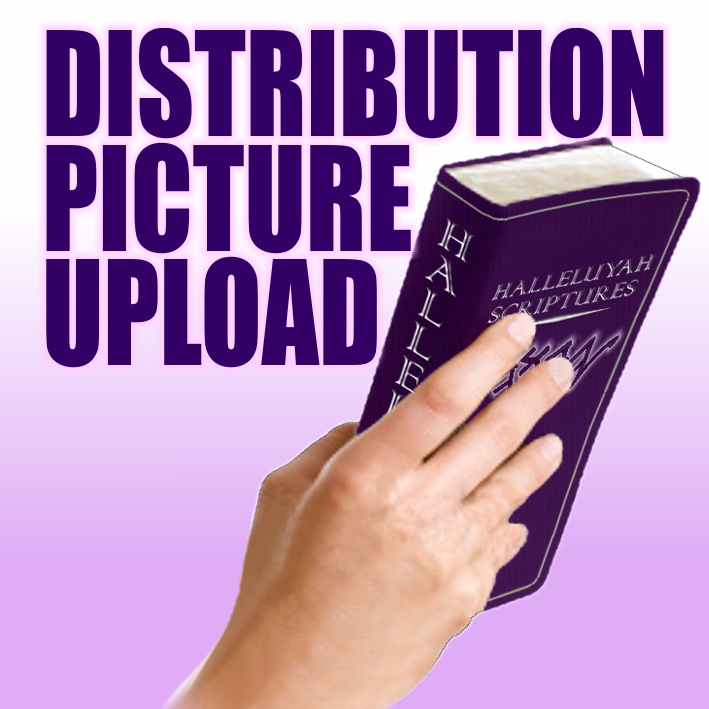 “YHWH your Elohim in your midst, is mighty to save. He rejoices over you with joy, He is silent in His love, He rejoices over you with singing.” -Tsephanyah/Zephaniah 3:17. Remember every breath in our lungs belongs to YHWH, make it count and use it for good. Shalom to all the extraordinary supporters of HalleluYah Scriptures! May peace and birekoth surround you always. We continually lift you up in our daily prayers, asking the Father to barak and sustain you as you have been such a vital part of this mission.
“YHWH your Elohim in your midst, is mighty to save. He rejoices over you with joy, He is silent in His love, He rejoices over you with singing.” -Tsephanyah/Zephaniah 3:17. Remember every breath in our lungs belongs to YHWH, make it count and use it for good. Shalom to all the extraordinary supporters of HalleluYah Scriptures! May peace and birekoth surround you always. We continually lift you up in our daily prayers, asking the Father to barak and sustain you as you have been such a vital part of this mission.
Your dedication, encouragement, and partnership over the years have left a profound impact on our hearts, and we are forever grateful for the role you play in advancing this sacred work. We are sharing this article from a number of team members and believers. It is one of the most important articles that has been written. Your prayers, fasting, and unwavering support have been a cornerstone of the Project’s success.
These acts of devotion reflect your love for the Father and your commitment to His children around the world. Each contribution, whether through resources, time, or spiritual intercession, has enabled us to bring His Word to those who have never had access to it. Your trustworthiness has not only supported the logistical aspects of this mission but has also strengthened and encouraged our team, giving us the resolve to continue this labor of love even in the face of challenges.

The messages and comments you have shared over the years have touched us in ways words can scarcely describe. Often, as we read your kind and heartfelt words, we find ourselves moved to tears, overwhelmed by the genuine care and compassion expressed. These messages remind us that this is not just a project—it is a family of believers united in purpose, working together to fulfill the Father’s will. Your words inspire us, offering a constant reminder of why we do what we do and how deeply this mission resonates with those who share in it. And messages come in at the right time, the Father knows when we are in need of encouragement and always brings someone along to lift our hearts – Thank you.

Your support has been a testimony to the power of collective effort and shared belief. Each prayer whispered, each fast undertaken, and each gesture of kindness contributes to the larger vision of ensuring that His Word reaches those in desperate need. Your actions are a reflection of His love, bringing joy and light to places where darkness has long prevailed. Knowing that we are joined by such incredible individuals fuels our passion and commitment, and we are honored to stand alongside you in this mission.
As a team, we are deeply humbled and profoundly grateful for the love you have shown us. Your steadfastness has carried us through difficulties and has been a source of strength during times of weariness. It is because of supporters like you that this mission continues to thrive, reaching those in the most remote areas of the world. Together, we are witnessing lives transformed, hearts uplifted, and countless individuals drawn closer to the Father.

We want you to know how much you are appreciated, not only for your tangible contributions but also for the love in which you give. Your sacrifices do not go unnoticed, and they are a powerful demonstration of the truth and love that binds us all. We thank YHWH for you daily, asking Him to pour out birekoth upon you and your families, to guide your steps, and to reward your truthfulness abundantly.
This journey has been made all the more meaningful because of your involvement. Your partnership has enriched this mission, adding depth, strength, and immeasurable value to every aspect of it. We are deeply moved by your commitment and your willingness to walk this path with us. It is our prayer that together we continue to praise the Father, reaching even more lives with His Word and sharing His love with those in need. May His peace and joy fill your hearts, and may you always know the profound gratitude we hold for you.

“And YHWH passed before him and proclaimed, “YHWH, YHWH, an El compassionate and showing favor, patient, and great in kindness and truth, watching over kindness for thousands, forgiving wickedness and transgression and sin, but by no means leaving unpunished, visiting wickedness of the fathers upon the children and the children’s children to the third and the fourth generation.” – Exodus 34:6-7
Something important we feel to share and feel we were directed by the Ruach as it is important and urgent subject. We realize that a number of you may be very upset with this message but take your time and read it even if it takes days and weeks, it truly is important and it pleases the Father and will be life changing for you.
The reality of life is that we have all been wronged and hurt by others. Some of these wounds are deep, while others are fleeting. Yet, regardless of the severity of the offense, the Command remains the same: forgive. The Father has made it clear that unless we forgive others, He will not forgive us. This is not a suggestion or a negotiable term—it is an unchanging truth. By refusing to forgive, we place ourselves outside the circle of His love, cut off from the Father, cutting ourselves off from His Commandments we so desperately need. If you do not understand cut off, this means you are no longer His and outside His will.

Forgiveness is a cornerstone of belief and morality, deeply embedded in the teachings of YHWH as revealed in the Bible. It is both a Command and a gift—a spiritual practice that liberates the heart, heals relationships, and reflects the nature of the Creator. To understand forgiveness and how to acquire it in our lives, we must delve into its amazing essence and the instructions provided in Scripture.
The Bible portrays forgiveness as an attribute of YHWH. In Exodus 34:6-7, YHWH is described as “compassionate and kind, slow to anger, abounding in love and truth, maintaining love to thousands, and forgiving wickedness, rebellion, and sin.” This revelation underscores that forgiveness is an intrinsic quality of YHWH, one that humans are called to emulate. Yet, forgiveness is not offered in a vacuum; it requires recognition of wrongdoing and genuine repentance.
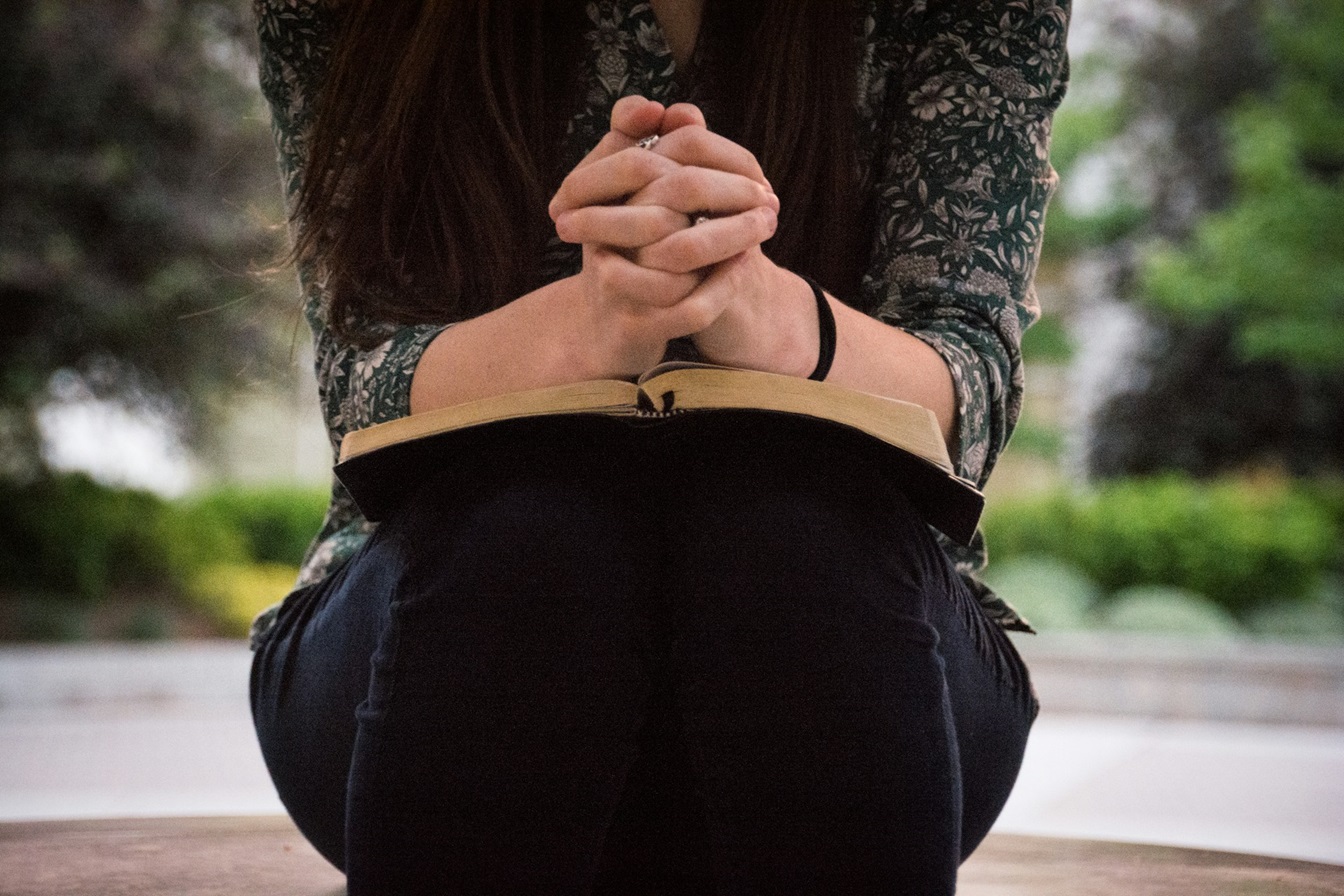
To acquire forgiveness, one must first understand its dual dimensions: seeking forgiveness from Elohim and extending forgiveness to others. Seeking forgiveness begins with humility, acknowledging our sins and shortcomings before the Creator. The Scriptures repeatedly emphasizes the importance of confession. In
1 Yohannan/John 1:9, it is written, “If we confess our sins, He is trustworthy and righteous to forgive us the sins and cleanse us from all unrighteousness.”
This act of confession is not a mere ritual but a profound acknowledgment of our dependence on Elohim’s compassion.
Forgiveness is one of the most profound and challenging acts we are called to embrace as human beings. It transcends mere words or fleeting emotions, reaching into the very essence of our hearts and requiring a deliberate, conscious decision to let go of resentment, anger, and the desire for retribution. Yet, it is forgiveness that liberates us from the chains of bitterness and sets our hearts free to experience peace and healing. Those who have suffered unimaginable atrocities at the hands of others often serve as living examples of the power and necessity of forgiveness, showing us that even in the face of profound pain, letting go is not only possible but essential.

Please note that when you do not forgive then that person controls your life and thoughts, and it becomes an idol that grows within you. This is not a good thing.
Throughout history, countless individuals and nations have endured unimaginable suffering and injustices. The Jewish people, for example, bore the unimaginable weight of the Holocaust—a period marked by unimaginable cruelty, where millions of innocent lives were destroyed under the shadow of hate. Entire families were wiped out, cultures devastated, and humanity brought to its lowest point.
Such deep wounds could understandably foster an enduring sense of bitterness and unforgiveness. Also, throughout history the Father’s people have suffered as they would not repent and turn back to Him. Yet, time and again, survivors have come forward with stories of choosing forgiveness, not for the sake of excusing the evil committed against them, but to reclaim their peace and rise above the hatred that sought to destroy them.
“I have treasured up Your Word in my heart, That I might not sin against You.” Tehillim/Psalms 119:11
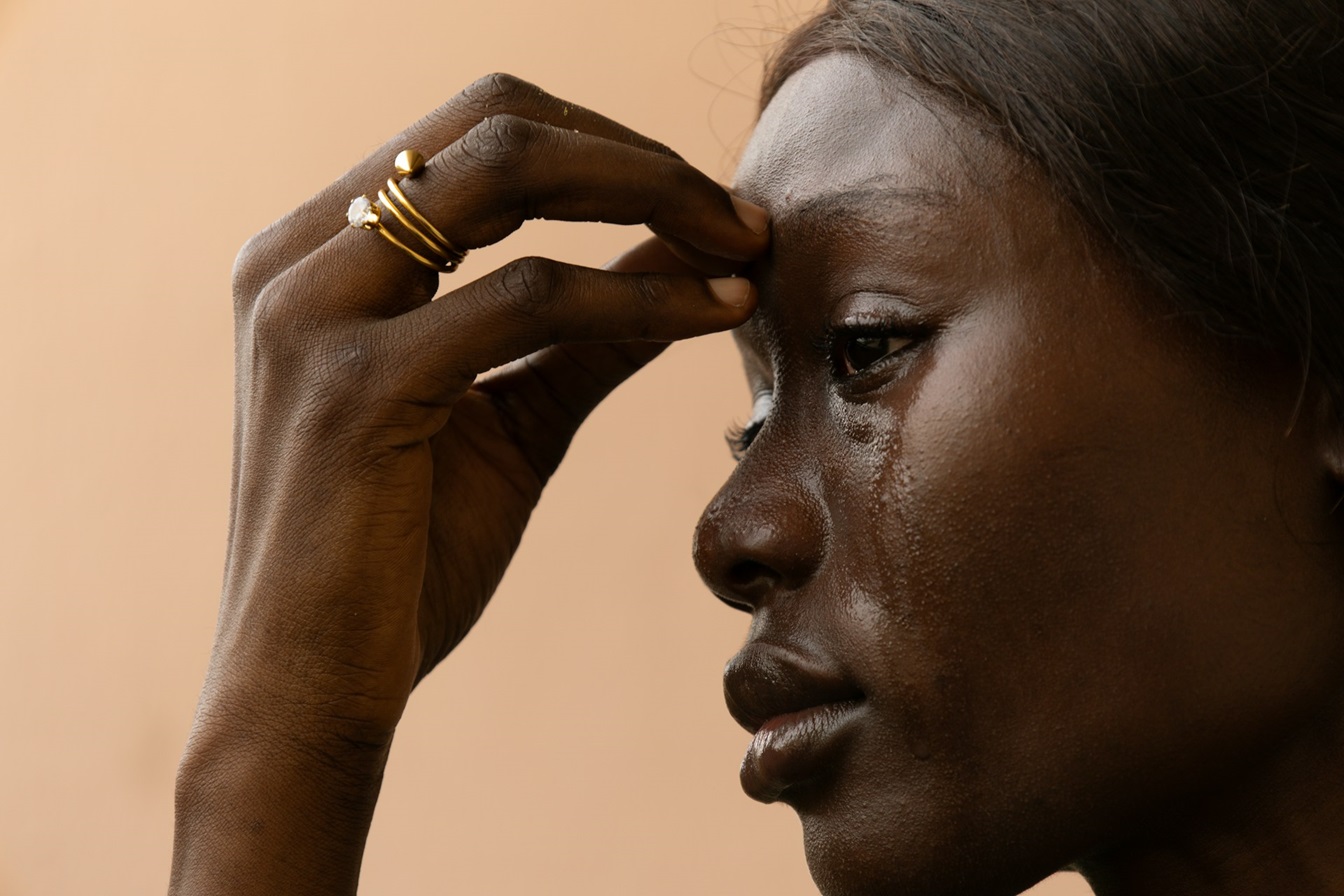
Similarly, many African nations carry the scars of colonialism and the transatlantic slave trade. These were periods of exploitation, degradation, and suffering that tore apart families, cultures, and identities. Generations endured unspeakable cruelty, yet many descendants of those who suffered have chosen to embrace forgiveness, working toward reconciliation and healing. This act of forgiveness does not diminish the gravity of the offenses but serves as a testament to the strength of the human heart—a strength that refuses to be enslaved by anger and resentment.
Indigenous peoples around the world, too, have faced centuries of displacement, cultural erasure, and systemic oppression. Their lands were taken, their ways of life dismantled, and their voices silenced. Despite these grave injustices, many have taken the path of forgiveness, seeking to rebuild relationships, preserve their heritage, and move forward with dignity and resilience.
The suffering endured by these individuals and nations far exceeds the petty grievances that often hold us captive. Too often, our unforgiveness stems from trivial matters—a few harsh words spoken in anger, disagreements over money, or perceived slights that bruise our pride. We cling to these offenses as if they define us, allowing them to fester and grow into barriers that isolate us from others and from the Father. These grow into something big inside our head and heart which the enemy loves and feeds which brings more bitterness and unforgiveness. Sadly, people allow the enemy to do this.
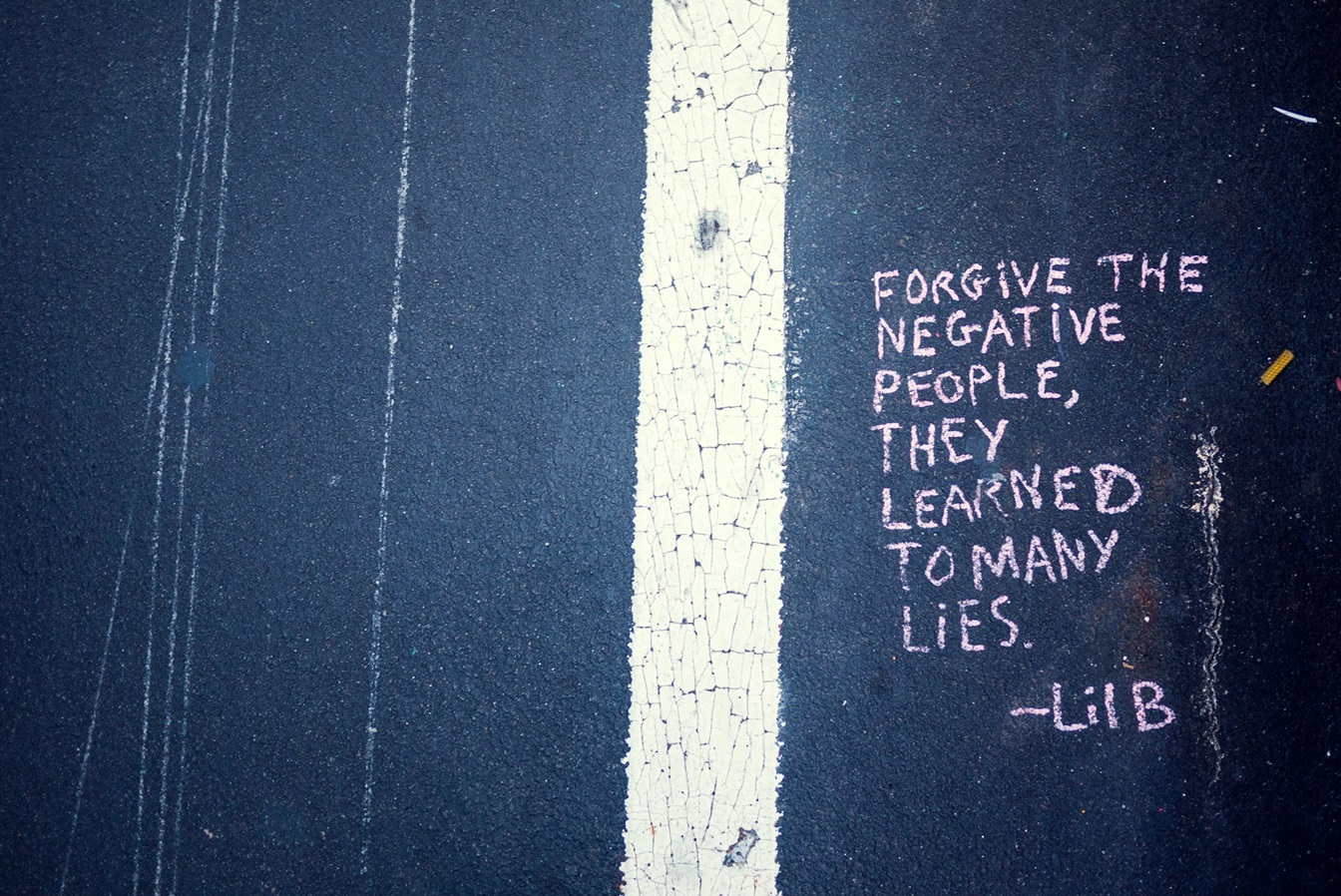
Yet, when we compare our grievances to the monumental pain endured by others, we are reminded of the disproportionate weight we give to our own hurts.
The story of the Waldensians is one of belief, perseverance, and unimaginable suffering. Originating in the late 12th century, this group of devout brethren arose as a movement committed to returning to the purity of the Gospel and the teachings of the Scriptures. Despite their noble intentions to follow YHWH’s Word and live righteous lives, the Waldensians faced relentless persecution over the centuries, suffering greatly at the hands of those who opposed their beliefs.
Their history serves as a poignant reminder of the cost of unwavering devotion and the strength found in belief amidst tribulation. We need to take note of their lives and the lives of those who suffered for standing up and following His Truth and not run to a man to save us, this is what many people do, run to a man in power to fight for them and save them, this is not Scripture and never turns out right. Man enslaves and turns you away from the Father and remember the Father gives you freedom.

The Waldensian movement began in the region of Lyon, France, under the leadership of Peter Waldo, a wealthy merchant who experienced a spiritual awakening. Inspired by the teachings of the Bible, Waldo renounced his material wealth and dedicated his life to preaching the Gospel. Just a side note, this is what the main team of the HalleluYah Scripture did some over 25 years or more ago forsook the world and sold all they had to serve the Father and you, His people.
Peter Waldo emphasized a return to the simplicity of the early Church, encouraging believers to read the Scriptures for themselves, reject the excesses of the established Church, and live lives of humility and holiness. Waldo’s message attracted followers who became known as the “Poor of Lyon” or Waldensians. They honored the Shabbat and Commandments, and history will not tell you, but they used the Names.

Despite many atrocities, the Waldensians remained steadfast in their beliefs. They continued to gather secretly for worship, often in caves or hidden valleys, and passed down their teachings from generation to generation. Their resilience was rooted in their unwavering trust in YHWH and their commitment to His Word. They believed that their suffering was a test of their belief and a means of drawing closer to the Father.
Another side note, the Father tests us and one thing He tests us on is Trusting in Him and forgiveness, letting go so that He can work in us for there is no room for the Father to work in one’s heart if it is filled with sin and unforgiveness. This spiritual fortitude enabled them to endure unimaginable hardships and to remain truthful even in the face of death. They would take a page of the Bible and copy it and then hand it out at markets secretly or wherever they went, and many ended up copying the pages to share as Bibles were only for the Catholic Church. There were bands of evil men that would travel to hunt down and destroy those that were walking in Truth. Even burning those who were copying from the Bible at the time. Most of them were rounded up and killed at the time.

The history of humanity is stained with countless instances of persecution, oppression, and exploitation, often targeting those who sought to live in harmony with their beliefs or simply to exist in peace. From religious martyrs to entire communities devastated by colonial and systemic oppression, the stories of suffering and resilience are both heart-wrenching and sobering. These narratives remind us of the human capacity for both cruelty and endurance, as well as the persistent trust for justice and freedom. Let us not forget those that have been and are tortured day in and day out each day, let us not forget those who slave and are worked to death to cloth and feed the those better of, this happens today all over the world and not a thought is given to them and their suffering.
“Continue in prayer, watching therein, with thanksgiving, praying at the same time also for us, that Elohim would open to us a door for the Word, to speak the secret of Mashiah, for which I am also in chains, so that I make it clear, as I should speak. Walk in wisdom toward those who are outside, redeeming the time. Let your word always be with favour, seasoned with salt, so that you know how you ought to answer each one. ” -Qolasim/Colossians 4:2-6
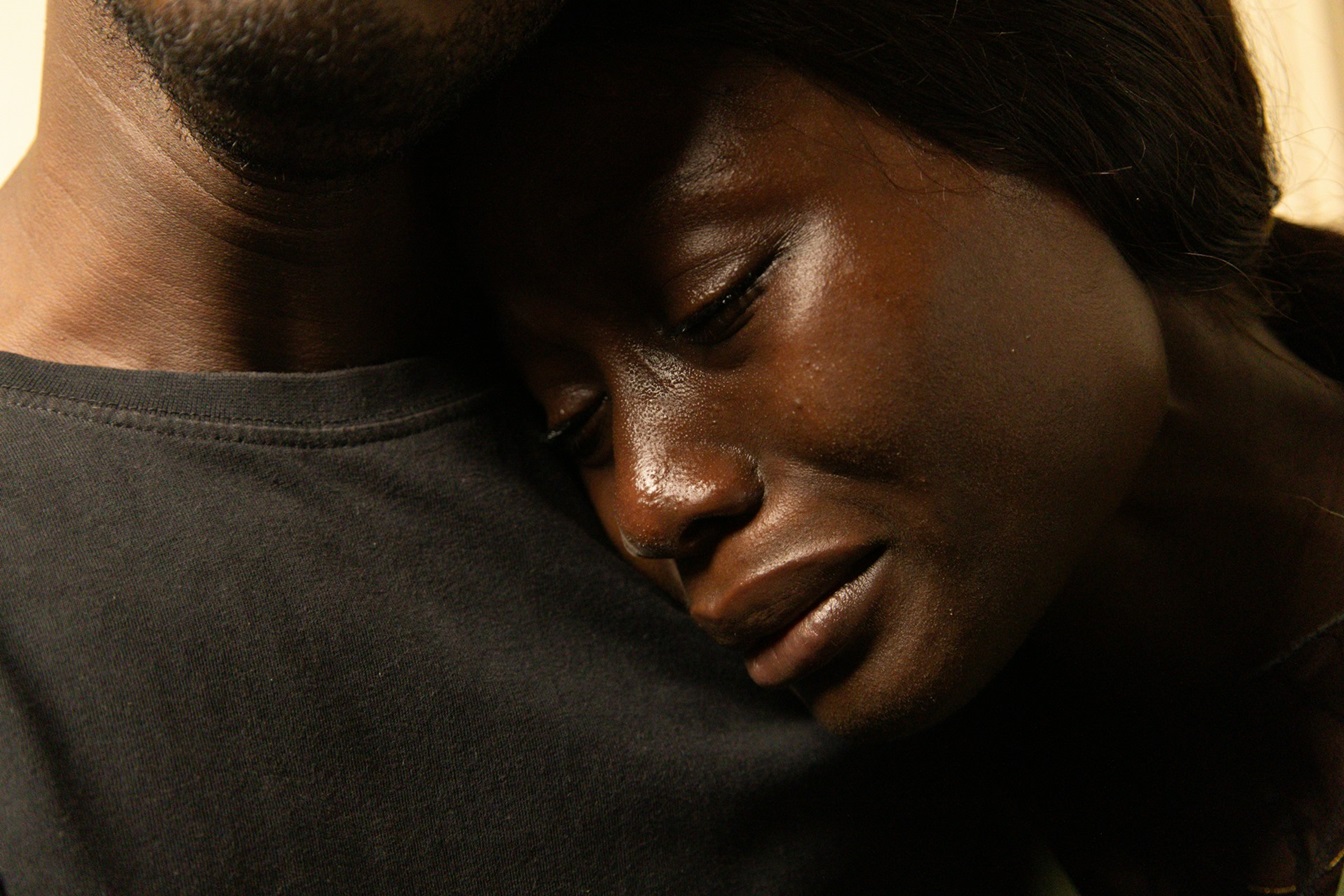
Religious persecution has long been one of the darkest aspects of human history, targeting those who sought to live according to their trust and convictions. Many individuals and communities have paid the ultimate price for their dedication to the Father and His Word. During periods such as the Inquisition and other brutal campaigns, countless believers who refused to conform to state-imposed religious norms were tortured, imprisoned, and executed. Among the most harrowing accounts are those of men and women burned at the stake for their unwavering commitment to live as the Father commanded. These martyrs endured unimaginable suffering, their deaths a covenant to their unshakable trust. Their courage and sacrifice highlight the struggle between oppressive systems and the human heart’s longing for spiritual freedom.
The plight of Native American tribes is another tragic chapter in history. Long before European colonizers arrived on their shores, Native Americans lived in harmony with the land, guided by spiritual traditions that emphasized respect for creation. However, with the advent of colonization, they faced systematic displacement, violence, and attempts to eradicate their cultures. Colonizers sought to impose their own religions and societal norms, often at the expense of the Native people deeply rooted spiritual practices. Entire communities were decimated, and those who resisted were met with brutal force. The trauma of this era still lingers, as the descendants of these communities continue to fight for the recognition of their rights and the preservation of their heritage.
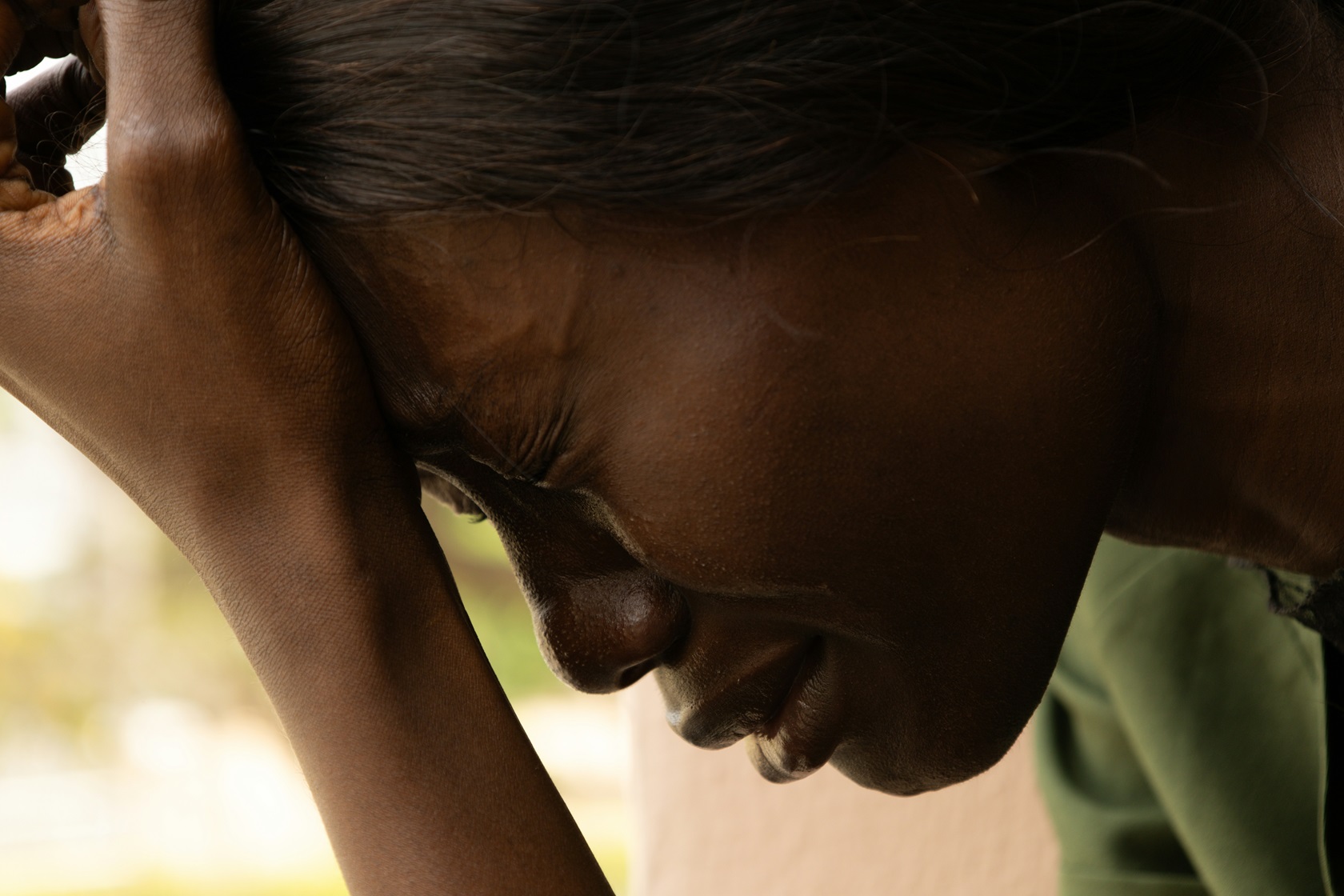
In India, the British colonial period brought profound suffering to the Indian people. The British exploited the land and its resources, often disregarding the spiritual and cultural values that defined Indian society. Traditional practices and ways of life were disrupted as the colonial administration imposed its own systems of governance and economic exploitation. The British policies created widespread famine, impoverishment, and despair. Indian society was fractured along lines of caste, religion, and class, further deepening the wounds inflicted by colonization. Despite these hardships, the Indian people maintained their spiritual traditions and resisted oppression through movements that called for self-determination and justice.
The Armenian Genocide is a somber reminder of the atrocities faced by a group targeted for their ethnicity and religious beliefs. During the early 20th century, the Ottoman Empire sought to annihilate the Armenian population through mass killings, forced marches, and widespread persecution. Entire villages were wiped out, and families were torn apart. The Armenians, who largely adhered to Christian traditions, faced persecution for their belief and identity. This genocide remains one of the most devastating examples of humanity’s capacity for destruction, and its legacy underscores the importance of remembrance and accountability. Also, the Killing Fields Cambodia, is another such terrible time. The Rwanda genocide was one of the worse of its time, the enemy loves to pit each person and race against itself. This happens today even in your own country.

The horrors of black slavery stand as one of history’s most egregious examples of human exploitation. Millions of African men, women, and children were forcibly removed from their homelands, subjected to inhumane treatment, and sold as property. Families were separated, lives were dehumanized, and entire generations were subjected to unimaginable suffering. Enslaved individuals were denied the most basic rights and were often forced to abandon their cultural and spiritual practices. Yet, despite these atrocities, the enslaved found ways to resist and to maintain their trust, often turning to belief in YHWH as a source of strength and resilience.
“Raise a shout for YHWH, All the earth! Serve YHWH with gladness; Come before His presence with singing. Know that YHWH, He is Elohim; He has made us, and we are His – His people and the sheep of His pasture. Enter into His gates with thanksgiving, And into His courts with praise. Give thanks to Him; barak His Name. For YHWH is good; His kindness is everlasting, And His truth, to all generations. ” – Tehillim/Psalms 100:1-5
Child slavery remains one of the most heartbreaking forms of exploitation. Around the world, countless children are forced into labor under brutal conditions, their innocence stolen and their futures compromised. These children are denied education, freedom, and the joys of childhood, all in the name of profit and greed. Child slavery is a stark reminder of the vulnerabilities of the most innocent among us and the need for worldwide efforts to protect and uplift them.
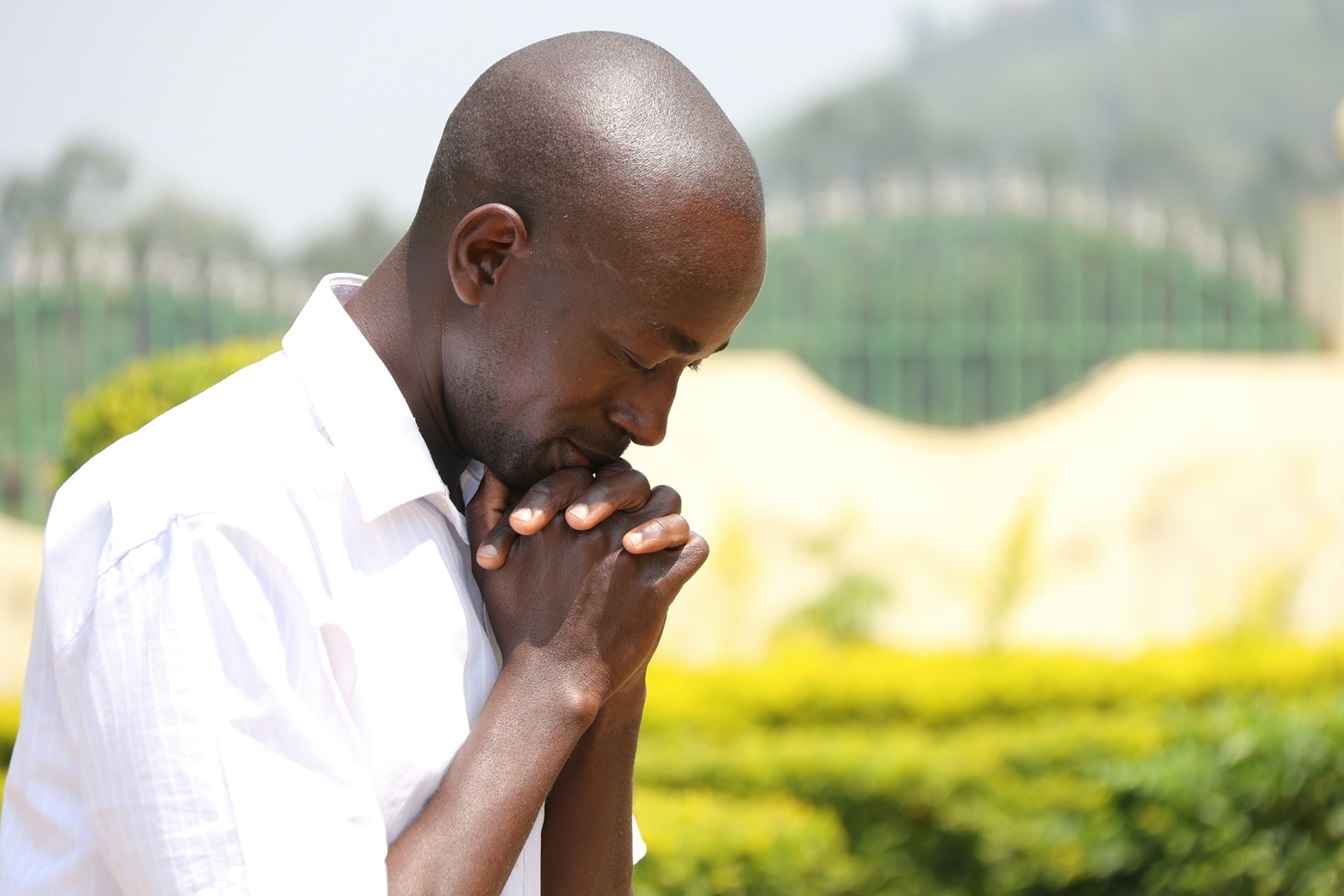
Equally devastating is the use of child soldiers, a practice that continues to plague conflict zones around the world. Children, often abducted from their families, are forced to participate in armed conflicts, enduring physical and psychological trauma. Stripped of their childhoods, they are manipulated into committing acts of violence, leaving deep scars that last a lifetime. These young victims of war are a haunting testimony to the toll of human conflict and the moral failures of societies embroiled in violence.
The Eskimos, or Inuit peoples, have faced centuries of marginalization and cultural erasure. Living in some of the harshest environments in this world, they developed unique ways of life deeply connected to the land and its resources. However, colonization and modern industrialization brought disruptions to their traditional practices, along with disease, displacement, and cultural assimilation. The Inuit have struggled to preserve their heritage, language, and connection to their ancestral lands in the face of systemic challenges.
The Incas, a powerful civilization in South America, were brought to their knees by Spanish conquistadors in the 16th century. Once a thriving society known for its architectural marvels, agricultural innovations, and spiritual practices, the Inca Empire was ravaged by greed and conquest. Spanish forces, driven by a lust for gold and land, decimated the Inca people through warfare, forced labor, and the spread of diseases like smallpox.
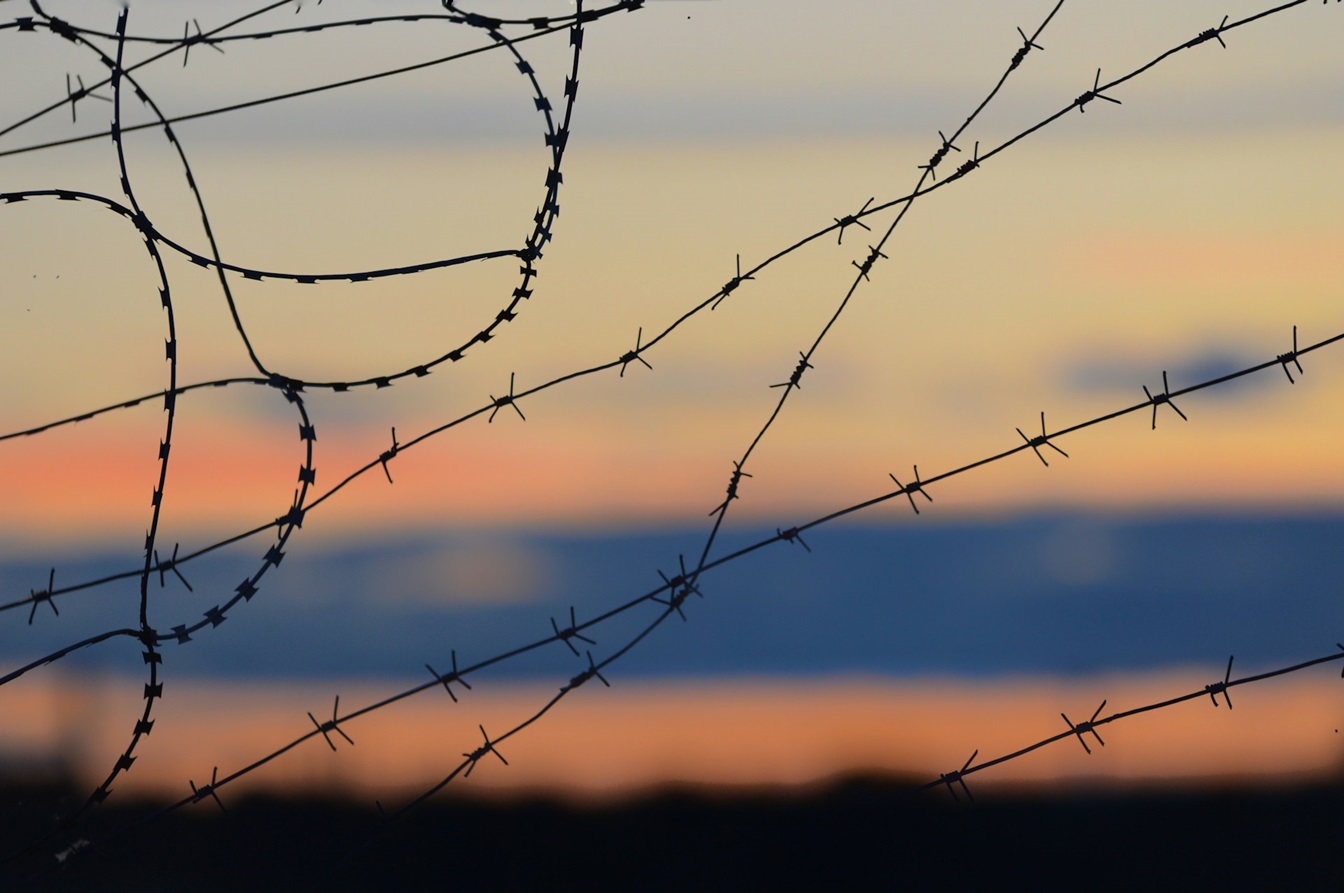
The Spanish Inquisition is another stark example of how power can be wielded to persecute and control. Established to enforce religious conformity, the Inquisition used torture, imprisonment, and public executions to root out heresy. Thousands of individuals, accused of deviating from Catholic orthodoxy, faced unimaginable suffering. Jewish and Muslim converts to Christianity, often accused of insincerity, were particularly targeted, as were others whose beliefs or practices diverged from the Church’s authority. The Inquisition stands as a chilling reminder of the dangers of religious extremism and unchecked power. Also, of the thousands that lost their life due to falsely being accused of being a witch.
The Aztecs, like the Incas, suffered greatly at the hands of Spanish conquerors. Their vibrant culture, characterized by complex religious practices, advanced engineering, and rich artistic traditions, was brought to a violent end. Hernan Cortes and his forces, armed with superior weaponry and aided by alliances with rival indigenous groups, overthrew the Aztec Empire. The fall of Tenochtitlan in 1521 marked not only the collapse of a powerful civilization but also the start of centuries of subjugation and exploitation of native peoples in the Americas.
Abuse within religious institutions, particularly against children, has emerged as one of the most harrowing scandals of recent history. For decades, children in religious institutions and schools, orphanages, and churches were subjected to physical, emotional, and sexual abuse by those entrusted with their care. This betrayal of trust has left deep scars on countless victims, many of whom struggle with lasting trauma. The systemic cover-up of these abuses further compounded the pain, as institutions prioritized their reputation over the welfare of the vulnerable.

“You are my El, and I praise You; You are my Elohim, I exalt You. Give thanks to YHWH, for He is good! For His kindness is everlasting.” -Tehillim/Psalms 118:28-29
The apartheid regime in South Africa institutionalized racial segregation and oppression, causing immense suffering to the black majority. Under apartheid, millions were stripped of their rights, forced into impoverished homelands, and subjected to humiliating laws that governed every aspect of their lives. Resistance to apartheid was met with brutal crackdowns, imprisonments, and killings.
During World War II, China suffered immense devastation at the hands of Japanese forces. The Rape of Nanking stands as one of the darkest chapters, with mass killings, rapes, and atrocities inflicted on the civilian population. Cities were razed, families torn apart, and millions perished in a campaign marked by unparalleled brutality. The suffering endured by the Chinese people during this time is a stark reminder of the horrors of war and the human cost of imperial ambition.
Then there are the China organ harvesting of tens of thousands of innocent people. This is going on today with many suffering through this including families.

Aboriginal peoples around the world have suffered centuries of colonization and cultural erasure. In Australia, the Stolen Generations, where Aboriginal children were forcibly removed from their families, exemplify the deep scars of systemic oppression. Colonizers sought to erase Aboriginal cultures, languages, and spiritual practices, viewing them as inferior. Despite these efforts, Aboriginal communities have fought to preserve their heritage and assert their rights. Even up to the 1990’s children of mix race were taken from their mothers/families.
The Filipinos endured colonial exploitation under both Spanish and American rule. The Spanish introduced Christianity and imposed their culture while exploiting the natural resources and labor of the Filipino people. Following the Spanish-American War, the Philippines became a colony of the United States, facing further economic and social oppression. Despite this, the Filipino people have maintained their rich cultural identity and a spirit of resilience. Most forgave their oppressors.
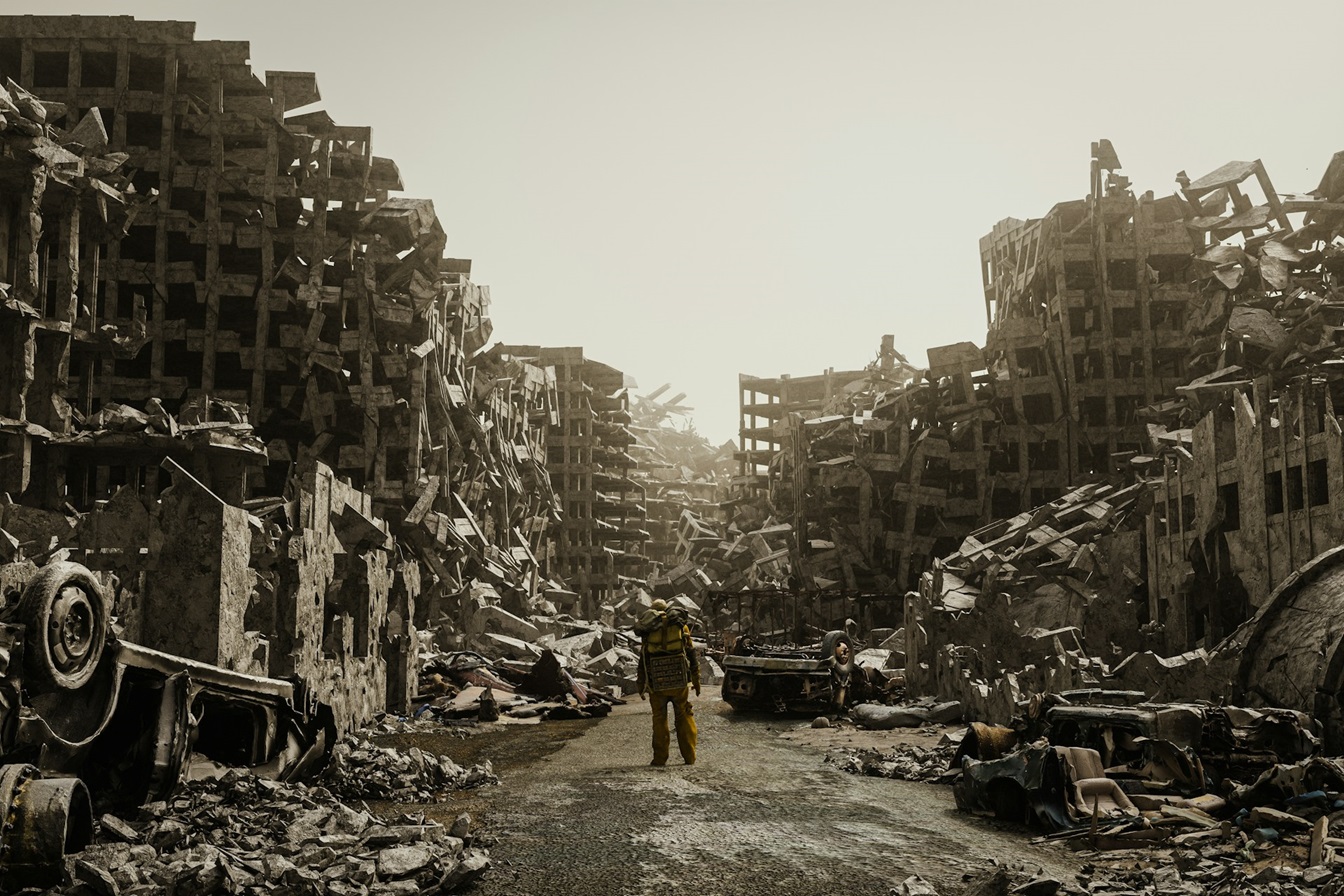
Eastern Bloc countries after World War II suffered under the grip of Soviet-style communism. Nations such as Poland, Hungary, Czechoslovakia, and East Germany faced political repression, economic stagnation, and the suppression of freedoms. The Iron Curtain became a symbol of division and suffering, as individuals who resisted communist regimes were imprisoned, tortured, or killed. The fall of the Soviet Union in the late 20th century brought new challenges, but it also marked the beginning of recovery and rebuilding for many of these nations.
“What shall I return to YHWH? All His bounties are upon me. I lift up the cup of deliverance, And call upon the Name of YHWH. I pay my vows to YHWH, Now in the presence of all His people. Precious in the eyes of YHWH Is the death of His kind ones. Ο YHWH, I am truly Your servant, I am Your servant, the son of Your female servant;You have loosed my bonds. I bring You a slaughtering of thanksgiving, And call upon the Name of YHWH. I pay my vows to YHWH In the presence of all His people, In the courts of the House of YHWH In your midst, O Yerushalayim. Hallelu-Yah! ” -Tehillim/ Psalms 116:12-19

Ukraine has faced immense suffering, from the Holodomor famine of the 1930s, orchestrated by Stalin’s Soviet regime, to the ongoing conflicts in the region. Millions perished in the man-made famine, a tool of political control that targeted Ukrainian independence and resistance. In more recent times, the country has endured military aggression, economic hardship, and political instability, yet the resilience of the Ukrainian people continues to shine through.
The plight of Messianic believers worldwide highlights the challenges faced by those who seek to live in accordance with their belief in YHWH and His Word. Often ostracized by both traditional religious communities and secular societies, Messianic encounter rejection, discrimination, and persecution. Yet, their unwavering commitment to the Scriptures and their desire to follow the Father’s commands inspire others to seek truth and live peacefully.

The stories of these peoples and communities underscore the depths of human suffering and the resilience of the human spirit. Each narrative is a powerful testimony to the enduring trust for justice and the strength found in belief and determination. By remembering and honoring these histories, we commit ourselves to the pursuit of a world where such injustices are not repeated.
These narratives are a call to action for all of us to fight against injustice, to advocate for the oppressed, and to work toward a world where dignity and freedom are upheld for all. By remembering and honoring these stories, we take a step toward ensuring that such atrocities are never repeated.

If those who have suffered the deepest wounds—survivors of genocide, slavery, and systemic oppression—can find it within themselves to forgive, how much more should we be willing to release the petty grievances that weigh us down? Our grievances pale in comparison to the atrocities endured by others, and yet we often cling to them as if they are insurmountable. In doing so, we rob ourselves of the joy and freedom that forgiveness brings.
Unforgiveness, no matter the cause, is a burden we are not meant to carry. It poisons our hearts, clouds our judgment, and distances us from the Father’s love. Scripture teaches us that if we do not forgive others, we cannot be forgiven ourselves. This is a sobering truth, one that calls us to examine our hearts and release the grudges we hold. Worse than this is the fact that the Scriptures warn that he who cannot forgive, and hates his brother is a son of the devil! Take a note of this very serious verse.

The Father calls those who do not forgive, “Children of the devil” and we know that children of the devil do not go to be with the Father when they die. This is very serious and should be a wakeup call.
1Jn 3:10 “In this the children of Elohim and the children of the devil are manifest: Everyone not doing righteousness is not of Elohim, neither the one not loving his brother.”
Forgiveness is not merely a recommendation; it is a commandment, a cornerstone of our belief. To withhold forgiveness is to place ourselves in opposition to the Father’s will and to deny the very compassion we seek for our own transgressions.

The act of forgiveness is not easy, nor does it come without struggle. It requires humility, empathy, and a willingness to relinquish the desire for vengeance. Yet, it is in forgiveness that we find freedom—freedom from the heavy chains of anger and bitterness, and freedom to embrace the peace that surpasses all understanding. Forgiveness is not about forgetting or condoning the wrongs done to us; it is about choosing to let go and entrust justice to the Father, who judges righteously.
Repentance is another crucial aspect of seeking forgiveness. True repentance involves a heartfelt turning away from sin and a commitment to walk in righteousness. The prophet Isaiah exhorts:

“Let the wicked forsake his way, and the unrighteous man his thoughts. Let him return to YHWH, who has compassion on him, and to our Elohim, for He pardons much” (Yeshayahu/Isaiah 55:7).
YHWH’s forgiveness is not reluctant; it is abundant and freely given to those who seek it sincerely.
Equally important is the necessity of extending forgiveness to others. YHWH’s forgiveness is a model for human relationships. In the Prayer of YHWH, His Ben teaches, “And Forgive us our debts, as we forgive our debtors” (Mattit/Matt 6:12). This petition links Elohim forgiveness with human forgiveness, creating a cycle of unity that sustains spiritual growth and harmony. Forgiving others is not optional; it is a command that reflects the transformative power of Elohim’s love in our lives.

The parable of the unforgiving servant in Matthew 18:21-35 illustrates the gravity of forgiveness. When Peter asked how many times he should forgive his brother, the Savior replied, “I do not say to you, up to seven times, but up to seventy times seven.” The parable reveals the hypocrisy of accepting Elohim’s vast forgiveness while withholding forgiveness from others. It reminds us that forgiveness is not a transaction but a lifestyle—a continuous act of unity rooted in Elohim’s compassion.
Acquiring forgiveness also involves letting go of bitterness and resentment. The Scriptures cautions against harboring unforgiveness, which can fester and poison the heart. Letting go of anger and embracing forgiveness liberates us from the burden of past wrongs, allowing us to live in peace and harmony.

Practically, forgiveness requires prayer and reliance on the Ruach ha Qodesh. Forgiving others, especially in cases of deep hurt, can feel impossible through human strength alone. However, our Savior assures us that what is impossible with man is possible with Elohim (Luke 18:27). Prayer becomes a vital tool for seeking assistance from above in cultivating a forgiving heart. By inviting the Ruach ha Qodesh to work within us, we can overcome our natural tendencies toward resentment and pride.
Forgiveness also requires trust in YHWH. It is an act of trust in Elohim’s justice and sovereignty. When we forgive, we relinquish the desire for revenge and entrust the situation to YHWH.

Romoyim/Romans 12:19 reminds us, “Beloved, do not revenge yourselves, but give place to the wrath, for it has been written, “Vengeance is Mine, I shall repay, says YHWH.”
By forgiving, we acknowledge that YHWH is the ultimate judge, and His ways are higher than ours.
When we choose to slander, hate, or abuse others, we step outside the will of YHWH and take upon ourselves a role that is not ours to bear. Judgment is reserved for the Creator, for He alone knows the hearts and minds of His creation and He does judge, but when we stand in His position to make judgement, we are making ourselves YHWH. He does not need us to abuse, hate, slander or accuse anyone. We as a team have learned this for years, slander, hate and abuse is not ours, it is the enemy using people to attack the Father and His Word and for us to say it is against us is prideful so this is why we will never enter into arguing or fighting as the battle is not ours. We would rather use our time wisely and help those in need.
Scripture warns against judging others harshly, reminding us that we, too, are fallible and in need of compassion.

Refusing to forgive not only disobeys Elohim’s mandate but also aligns us with sin. When we withhold forgiveness, we harden our hearts and distance ourselves from the love of YHWH. Furthermore, joining others in their refusal to forgive perpetuates wickedness and makes us complicit in their sin. When a person sits to listen to someone who is unforgiving day in and day out which leads to years, they are enabling that sin to continue, and they will be judged for that. It is better to not waste time but encourage the person to forgive and hand it over to the Father. This is a grave matter, for the Bible warns that we will be judged according to our own actions and attitudes.
When we choose not to forgive, we unwittingly surrender control of our lives to the very individuals who have wronged us. By holding on to anger, resentment we not only hold on to idolatry and sin we allow the hurt they caused to take root in our hearts whereby they control our lives, overshadowing our thoughts, emotions, and actions. Instead of finding freedom and healing, we become trapped in a cycle of pain that denies us the peace and joy we so desperately seek. Forgiveness, therefore, is not just a gift we give to others—it is an act of liberation for ourselves, a path to reclaiming our inner peace and emotional well-being.

It also binds us to the past, tethering us to the moments of hurt and betrayal. Every time we dwell on the offense, replaying the memory in our minds, we empower it to shape our present and future. The person who hurt us may move on with their life, completely unaware of the hold they still have over us, while we remain imprisoned by the weight of the grievance. It is a silent but powerful chain that keeps us from living fully, clouding our ability to experience love, contentment, and fulfilment. Also, the hurt is added to each time you replay it and it becomes bigger and bigger.
Without forgiveness, bitterness takes root in the heart. This bitterness acts like a bane, seeping into every aspect of our lives—our relationships, decisions, and even our health. It can distort our perception, making us suspicious of others, closed off to kindness, and incapable of trusting those around us. Instead of finding peace, we spiral deeper into negativity, allowing the original hurt to define who we are. This is the insidious nature of unforgiveness: it does not just harm our relationship with the person who wronged us; it infiltrates and diminishes every part of our lives. Along with gossip and slander it feeds a spirit within that needs to be feed each day as it is an addition that many are not aware of and Scripture strongly warns of.
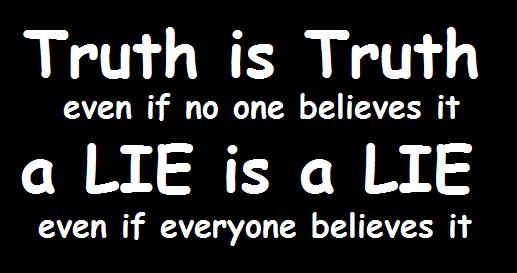
Living counter to the world’s ways brings freedom. By releasing our attachment to material possessions and societal expectations, we free ourselves from the chains of stress and anxiety. We find peace in trusting YHWH to provide for our needs, as our Savior reassures us in
Matt /Matthew 6:31-34 “Do not worry then, saying, ‘What shall we eat?’ or ‘What shall we drink?’ or ‘What shall we wear?’ “For all these the gentiles seek for. And your Father of the shamayim knows that you need all these. “But seek first the reign of Elohim, and His righteousness, and all these shall be added to you. “Do not, then, worry about tomorrow, for tomorrow shall have its own worries. Each day has enough evil of itself.”

True peace and joy are gifts that cannot coexist with unforgiveness. These birekoth flow from a heart that is free from the burdens and hatred. When we forgive, we release the hold that anger and pain have on us. We let go of the power the offense holds and step into the healing and renewal that forgiveness brings. Forgiveness does not mean forgetting or excusing the wrong; it means choosing to no longer be controlled by it. It is a deliberate act of releasing ourselves from the grip of the past and embracing the possibility of a brighter, more peaceful future.
The act of forgiveness is deeply transformative. It shifts our focus from the harm done to us to the potential for growth and healing. It requires humility, as we acknowledge that we, too, are imperfect and in need of compassion. It takes strength, as we choose to rise above our pain rather than let it define us. Most importantly, forgiveness connects us to a higher purpose, aligning us with the amazing principle of unity and love. It is through forgiveness that we reflect the very nature of the Father, who forgives us without hesitation when we turn to Him in repentance.

When we resist forgiveness, we inadvertently block the birekoth meant for us. Holding on to grudges keeps us from fully receiving the peace and joy the Father desires for our lives. Forgiveness is the key that unlocks these gifts, allowing us to experience life in its fullness. By forgiving, we no longer carry the weight of bitterness and anger, and our hearts are free to be filled with gratitude, love, and contentment.
Choosing forgiveness does not diminish the wrong that was done to us. Instead, it acknowledges that the offense has no lasting power over us. It is a declaration that we will not allow pain to dictate our lives or rob us of our happiness. Forgiveness empowers us to take back control, to focus on our own growth and healing, and to live in the freedom that comes from releasing the burden.

It is not just a gift we offer to others—it is a profound act of self-love. It is a decision to prioritize our peace and well-being over the desire for retribution. It is a journey toward healing and wholeness, one that liberates us from the past and opens the door to a future filled with belief and possibility. By forgiving, we choose to break the chains of anger and pain, embracing instead the joy and peace that only forgiveness can bring.
In the coming days, months, and years, the world will face challenges like never before. Hardship, uncertainty, and suffering will increase, we are not in the last days and things are escalating at a fast speed, sadly a number cannot see this and are deceived thinking a man is going to save them, and it is during these times that we will need the Father’s protection and provision more than ever. But how can we expect Him to shield us if we harbor unforgiveness in our hearts? How can we call upon Him for compassion if we refuse to extend it to others? To be forgiven, we must forgive. To receive His birekoth, we must align our hearts with His will, and that begins with letting go of anger, resentment, and hatred.
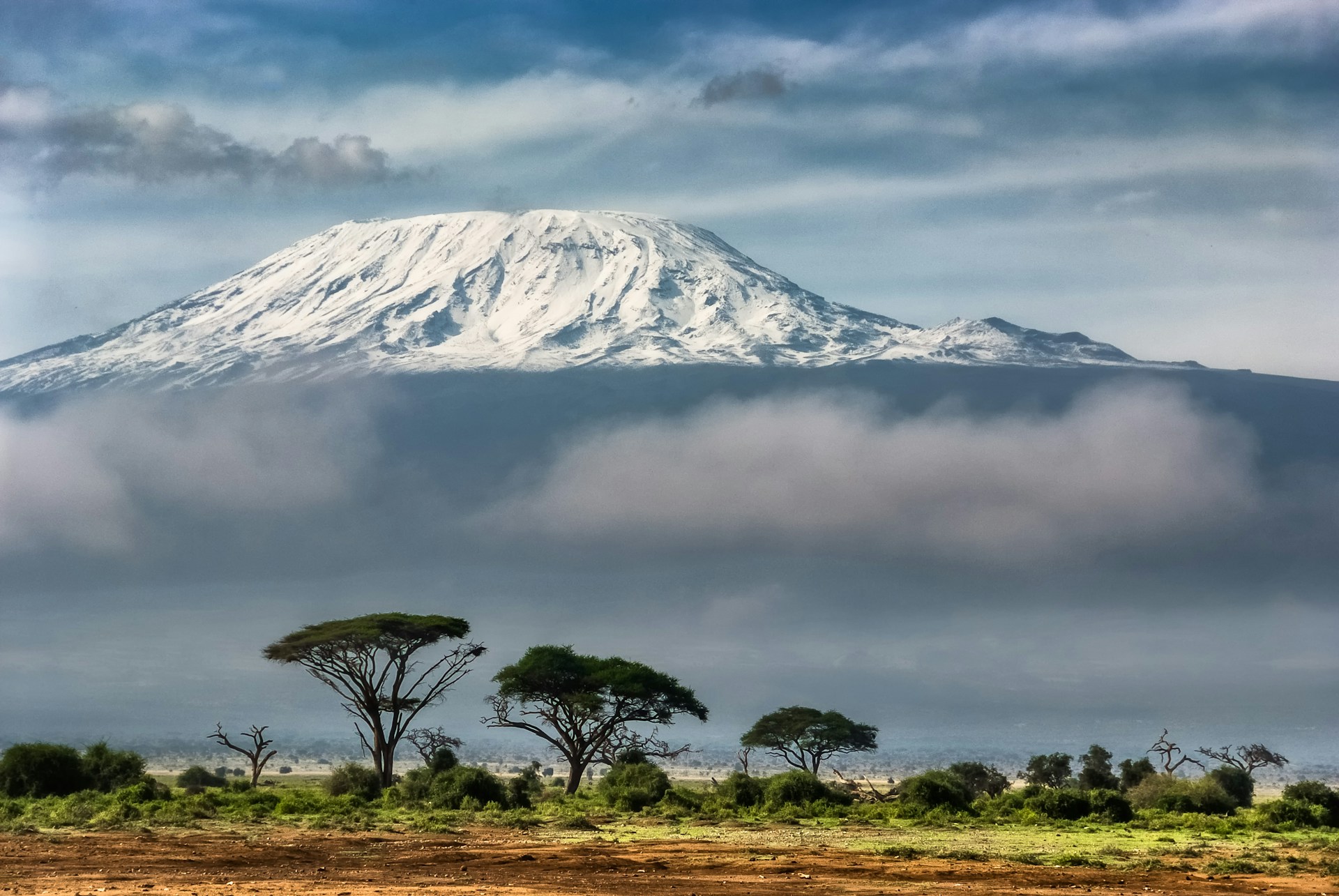
Unforgiveness is a toxin that destroys from within. It clouds our judgment, hardens our hearts, and distances us from the Father’s presence. It creates a barrier between us and Him. When we cling to grudges, we give power to the very things that hurt us, allowing them to control our thoughts, emotions, and actions. This is not the life the Father desires for us. He calls us to freedom, and that freedom is found in forgiveness.
Forsaking the ways of the world is not without its challenges. It requires a deliberate effort to resist the culture of consumerism and self-centeredness that surrounds us. It demands a shift in our priorities, focusing not on what we can accumulate but on how we can serve YHWH and others. This transformation begins with a renewal of the mind, as Paul encourages in
Romoyim/Romans 12:2″And do not be conformed to this world, but be transformed by the renewing of your mind, so that you prove what is that good and well- pleasing and perfect desire of Elohim.”

The stakes are high. The time to act is now. The Father has shown us through His Word that forgiveness is non-negotiable. He has forgiven us of our sins, of debts so great we could never repay them. In return, He commands us to forgive others as He has forgiven us. If we fail to do so, we risk forfeiting the very forgiveness we seek from Him. We risk standing before Him with hearts stained by unforgiveness, unprepared to receive His peace.
The days ahead will not be easy. They will demand belief, strength, and unwavering trust in the Father. To endure, we must ensure our hearts are right with Him. We cannot carry the weight of unforgiveness into the battles to come. It will weaken us, distract us, and ultimately separate us from the source of our strength. Forgiveness is not a sign of weakness; it is a covenant to the transformative power of the Father’s love in our lives.

There is no justification for withholding forgiveness as people sin against the Father not against us, when we start to understand this, it makes it easier to forgive. When we witness the profound suffering of countless individuals and believers throughout the world. Their hardships, trials, and enduring belief despite immense pain serve as powerful reminders of the resilience of the human spirit and the amazing call to let go of bitterness. To cling to unforgiveness in the face of such examples is to close our hearts not only to others but also to the transformative love and peace of the Father. It is a reflection of selfishness and pride—a refusal to humble ourselves and extend the same compassion we so readily seek.
Unforgiveness is a weight that chains us to the past, keeping us from experiencing the fullness of life and the joy of reconciliation. It blinds us to the suffering of others, narrowing our perspective to focus only on our own pain. When we harbor resentment, we allow ourselves to be consumed by a sense of entitlement, believing that our grievances outweigh the pain and struggles faced by others. This self-centeredness prevents us from empathizing with those who have endured far greater hardships yet found the strength to forgive.

Consider those who have endured atrocities and still chosen forgiveness—survivors of war, persecution, and systemic injustice. Their lives have been marked by unimaginable pain, yet they rise above their circumstances, refusing to let hatred and anger define their hearts. These individuals and communities serve as living examples of the power of forgiveness, demonstrating that even in the darkest moments, it is possible to release the burden of resentment and embrace peace. Their courage shames our petty grievances, which often pale in comparison to their struggles. Sadly, many think they are doing YHWH a favor by hunting down, accusing and making up stories and abusing others as if they have the right to stand in the place of YHWH. Run from these types of people.
“Because you say, ‘Rich I am, and I am made rich, and need none at all,’ and do not know that you are wretched, and pitiable, and poor, and blind, and naked.” -Hazon/Revelation 3:17
When we refuse to forgive, we prioritize our own pride over the well-being of others. We become so consumed by our own sense of offense that we lose sight of the greater picture. Our unwillingness to let go of anger or resentment blinds us to the needs and pain of those around us. It isolates us, creating walls that prevent genuine connection and compassion. In doing so, we not only harm ourselves but also fail to fulfill our responsibility to love and care for others as the Father has commanded.

Selfishness and pride lie at the root of unforgiveness. Pride convinces us that our pain is unique and more significant than the struggles of others. It whispers that we are justified in withholding forgiveness, that we have the right to nurture our anger and resentment. Selfishness fuels this mindset, focusing our energy inward and fostering a sense of entitlement that blinds us to the transformative power of compassion. Together, these traits create a barrier between us and the Father, preventing His love and peace from flowing freely in our lives.
Forgiveness is not about excusing wrongdoing or pretending that pain does not exist. It is about releasing ourselves from the grip of anger and trusting the Father to bring justice in His time and His way. It is an act of love, a declaration that we value His commands above our own desires for retribution. When we forgive, we align ourselves with His will, opening our hearts to His healing and restoration.
The suffering of others, especially those who endure immense trials yet choose forgiveness, should serve as a wake-up call. It reminds us of the insignificance of our own grievances in the grand scheme of life and eternity. If those who have experienced unimaginable pain can forgive, how much more should we be willing to release the comparatively minor offenses we hold onto? By refusing to forgive, we not only dishonour their example but also rob ourselves of the peace and freedom that forgiveness brings.

The teachings of Scripture guide us not toward the accumulation of worldly possessions but toward a life of surrender, trust, and readiness to follow the Father’s will at all costs. In a world that constantly beckons us to prioritize material wealth and worldly achievements, the words of YHWH remind us of a higher calling: to seek first His kingdom and righteousness. The pursuit of this world’s goods and ways not only distracts us from our spiritual journey but also binds us to a cycle of stress, anxiety, and misplaced priorities, ultimately leading to spiritual stagnation and the erosion of forgiveness in our hearts.
The Bible warns explicitly against the dangers of storing up treasures on this world. In Mattithyahu/Matthew 6:19-21, the Savior teaches “Do not lay up for yourselves treasures on earth, where moth and rust destroy and where thieves break in and steal,but lay up for yourselves treasures in the shamayim, where neither moth nor rust destroys and where thieves do not break in and steal. “For where your treasure is, there your heart shall be also.”
This powerful instruction emphasizes the fleeting nature of worldly possessions and the eternal value of spiritual wealth. When our hearts are consumed with the things of this world, we lose sight of the treasures that truly matter—trust, love, and obedience to the Father.

The demands of modern life often mold us into patterns of busyness, striving, and accumulation. From a young age, we are taught to measure success by the standards of the world: wealth, status, and possessions. This mindset keeps us perpetually occupied, chasing after things that bring temporary satisfaction but leave our hearts longing for something greater. The Apostle Paul, in 1 Timotiyos/1 Timothy 6:9-10, warns of the dangers of this pursuit: “But those wanting to be rich fall into trial and a snare, and into many foolish and injurious lusts which plunge men in ruin and destruction. For the love of money is a root of all kinds of evil, for which some, by longing for it, have strayed from the belief, and pierced themselves through with many pains. “
The world’s ways are not neutral; they shape us in ways that can lead to stress, anxiety, pain, and even unforgiveness. The constant pressure to achieve and acquire creates an environment where peace and contentment are elusive. Relationships often suffer as we prioritize our ambitions over the people around us. Furthermore, the world’s focus on self-interest and competition can breed resentment and bitterness, making it harder for us to extend love and forgiveness to others.
The idea that we cannot serve two master’s is a profound truth that resonates deeply within the spiritual teachings of the Father. To serve both YHWH and money is not only impossible but also a direct contradiction to the essence of true belief. Our hearts are created to be wholly dedicated to the Creator, and anything that competes for that becomes an idol, pulling us away from the life of unity and obedience we are called to live. The tension between serving YHWH and pursuing wealth is a struggle as old as humanity itself, yet the answer remains unchanged: we must choose whom we will serve, for it is impossible to give our loyalty and love to both.

Scripture calls us to be different, to forsake everything for the sake of our belief if necessary. Throughout history, countless believers have lived out this truth, forsaking their possessions, comforts, and even their lives for the sake of their convictions. Their sacrifices testify to the enduring power of trust in YHWH and the eternal rewards that far surpass any worldly gain.
YHWH calls us to a life of surrender, one where our trust, love, and purpose are rooted in Him alone. When we attempt to divide our allegiance, prioritizing material gain alongside our relationship with Him, we deceive ourselves. The pursuit of wealth often brings with it a shift in focus, turning our hearts toward fleeting earthly rewards rather than eternal treasures. This duality is unsustainable. Love for one master inevitably leads to disdain for the other, as their demands and purposes conflict. YHWH, in His wisdom, knows that a divided heart is a dangerous heart, prone to being led astray.

To serve two master’s is to live in a state of conflict, torn between two opposing forces. This inner struggle breeds anxiety, dissatisfaction, and a lack of peace. Only by choosing to serve YHWH wholeheartedly can we find true freedom and fulfillment. His yoke is easy, and His burden is light, unlike the relentless demands of wealth. He invites us to trust Him, to walk in His ways, and to experience the abundant life that comes from a heart fully surrendered to Him.
Money, while a necessity in the practical aspects of life, is a poor master. It demands relentless attention, creates insatiable desires, and often blinds us to what truly matters. The pursuit of wealth can easily become an all-consuming obsession, leaving little room for our belief, compassion, or genuine connection with the Father. It fosters greed, envy, and selfishness, distancing us from the selfless love and service that YHWH requires. The more we allow money to dominate our thoughts and actions, the more it becomes an idol, replacing the Father as the center of our lives.
The readiness to forsake everything is not just about physical possessions; it is also about letting go of the world’s influence on our hearts and minds. The Apostle John writes in 1 Yohanan/1 John 2:15-17, “”Do not love the world nor that which is in the world. If anyone loves the world, the love of the Father is not in him. Because all that is in the world – the lust of the flesh, the lust of the eyes, and the pride of life is not of the – Father but is of the world. And the world passes away, and the lust of it, but the one doing the desire of Elohim remains forever.”

This passage challenges us to examine where our true loyalties lie and to choose the eternal over the temporary. In turning away from the world’s values, we also open our hearts to forgiveness. The distractions and pressures of worldly pursuits often leave little room for the love and patience required to forgive others. However, when we prioritize our relationship with the Father and align our lives with His will, we cultivate a heart that reflects His love and compassion. Forgiveness flows more naturally when we are not weighed down by the burdens of worldly expectations and grievances.
Serving YHWH requires a heart wholly dedicated to Him. It means trusting Him to provide for our needs, even when material circumstances seem uncertain. It calls for a perspective that values eternal riches over temporary gains. Serving YHWH is a life of light, where we recognize that everything, we have come from Him and is to be used for His purposes. It is a life where humility, and love take precedence over accumulation and self-interest. To serve YHWH is to align ourselves with His will, finding our identity and purpose in Him rather than in the fleeting security of wealth and what this world offers.

The clash between these two masters—YHWH and money/the world—is ultimately a battle for our hearts. Money promises comfort, power, and status, but it can never offer the peace, joy, and fulfillment that come from a relationship with the Father, you never have enough of it and you want more and more. It is a deceptive master, one that leads us further from the truth and deeper into spiritual emptiness. YHWH, by contrast, offers life, joy, and salvation. His ways are not burdensome, but they do require surrender—a letting go of the false sense of control and security that wealth provides.
The choice is clear, but it is not always easy. The world constantly tempts us with the allure of material success, convincing us that our worth is tied to our possessions and that our happiness depends on acquiring more. Yet, the wisdom of YHWH reveals the futility of this pursuit. Wealth is fleeting; it cannot be taken with us, nor can it bring true contentment. The treasures of this world pale in comparison to the eternal rewards promised to those who seek first the Kingdom of YHWH and His righteousness.
When we choose to serve YHWH, we reject the enslavement of materialism. We acknowledge that He is the ultimate provider, capable of meeting all our needs far beyond what money can offer. Serving Him requires us to live with open hands, willing to give generously, knowing that everything we have is a gift from Him. It shifts our focus from self-centred accumulation to selfless stewardship, using our resources to barak others and honor the Father.
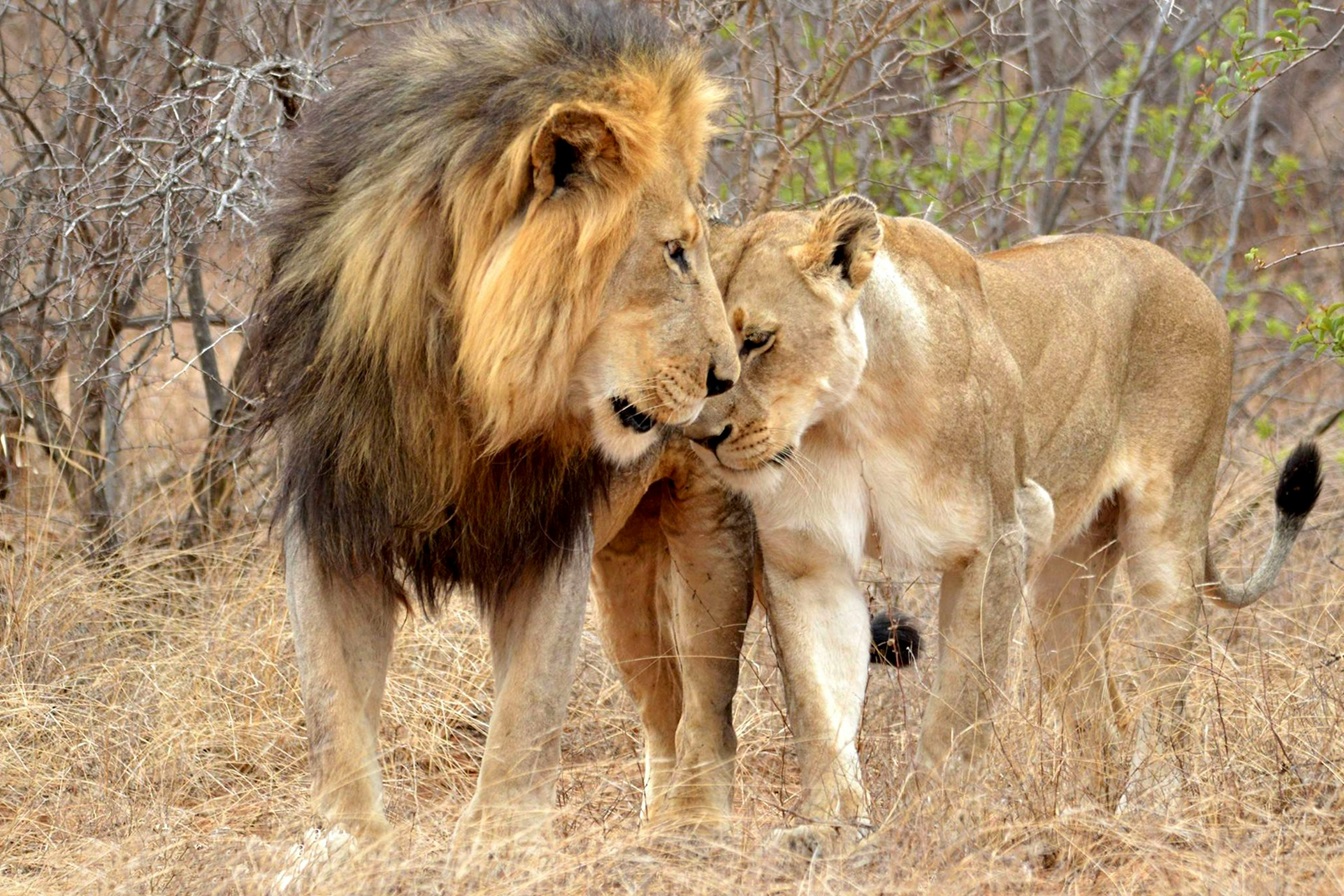
“So, then, everyone of you who does not give up all that he has, is unable to be My talmid.”Luqas/Luke 14:33
The decision to serve YHWH over money is a matter of eternal significance. It is a choice that reflects the condition of our hearts and our understanding of what truly matters. By choosing Him, we align ourselves with the source of all provision and joy, securing not only our present peace but also our eternal inheritance. Let us, therefore, cast aside the false promises of wealth and dedicate ourselves fully to the One who alone is worthy of our Elohim. For in serving YHWH, we find the purpose, fulfillment, and unity that no amount of money could ever provide.
Ultimately, our lives are a reflection of where our treasures lie. If we treasure the things of this world, our hearts will be ensnared by its fleeting pleasures and inevitable disappointments and this effects unforgiveness. But if we treasure the things of shammayim—truth, joy, love, and obedience to YHWH—we will experience the peace and joy that come from walking in His ways. The choice is clear, and the call is urgent: to forsake the world’s goods and ways, to surrender fully to the Father’s will, and to live in readiness for His eternal kingdom. Let us lay aside every weight that hinders us and run with perseverance the race marked out for us, fixing our eyes on YHWH and storing up treasures that will last forever. This brings a wonderful peace and joy and also helps to forgive faster.

Let us take this moment to examine our hearts, to confront the bitterness and resentment we may be harboring. Let us choose to forgive, not because the other person deserves it, but because we desire to be obedient to the Father. Let us release the anger that binds us, trusting Him to heal our wounds and bring justice in His time. The choice to forgive is not just about the past—it is about the future. It is about preparing ourselves for what lies ahead, ensuring that our hearts are free to receive the Father’s guidance, provision, and peace.
Do not wait until it is too late. Do not let unforgiveness rob you of the Father’s birekoth and protection. Forgive as you have been forgiven and align your life with His will. Only then can you stand firm in the days to come, secure in His love and surrounded by His love. Forgiveness is the key to freedom, the pathway to peace, and the proof of a heart surrendered to the Father. Choose it today, and step into the life He has prepared for you—a life of joy, strength, and unshakable trust in YHWH.
Let us, therefore, humble ourselves and choose forgiveness. Let us release the anger and resentment that weigh us down, embracing instead the freedom and healing that come from aligning our hearts with the Father’s will. We not only reflect His love and compassion but also prepare ourselves to receive the fullness of His peace. Forgiveness is not weakness—it is the ultimate act of strength and belief, a covenant to the transformative power of His love in our lives.
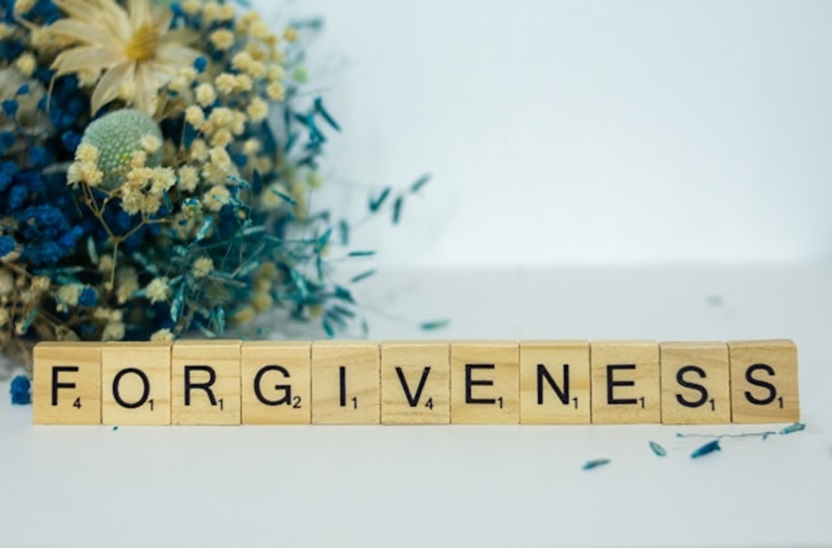
We wish to take a moment to express our heartfelt gratitude to all of our supporters who have journeyed alongside us through both the trials and triumphs. Your unwavering dedication, prayers, fasting, and generous contributions have been the cornerstone of the work we have been barak to carry out. It is with profound appreciation that we acknowledge the incredible impact your support has had on this mission, allowing us to serve and uplift many of the Father’s people.
Thank you for being there with us on this important journey and not putting your hands with the wicked ones to do evil against the Father’s Word. We know our time is very limited now and dark days are ahead, but we will continue until our last breath. We have done the best we can with the time given and know in our hearts we did the best we could for the Father and His people. We want no thanks or praise for it all belongs to the Most High.
May the Father barak you richly, as you have been a birekoth to so many. May His favor shine upon you, and may you continue to find joy and fulfillment in the knowledge that your efforts are making a difference in the lives of others. Thank you for standing with us, for believing in this mission, and for being a living reflection of the Father’s love in action.
A wonderful message from a close friend and supporter of the HalleuYah Scriptures project, we pray this touches your hearts and help those that have unforgiveness.
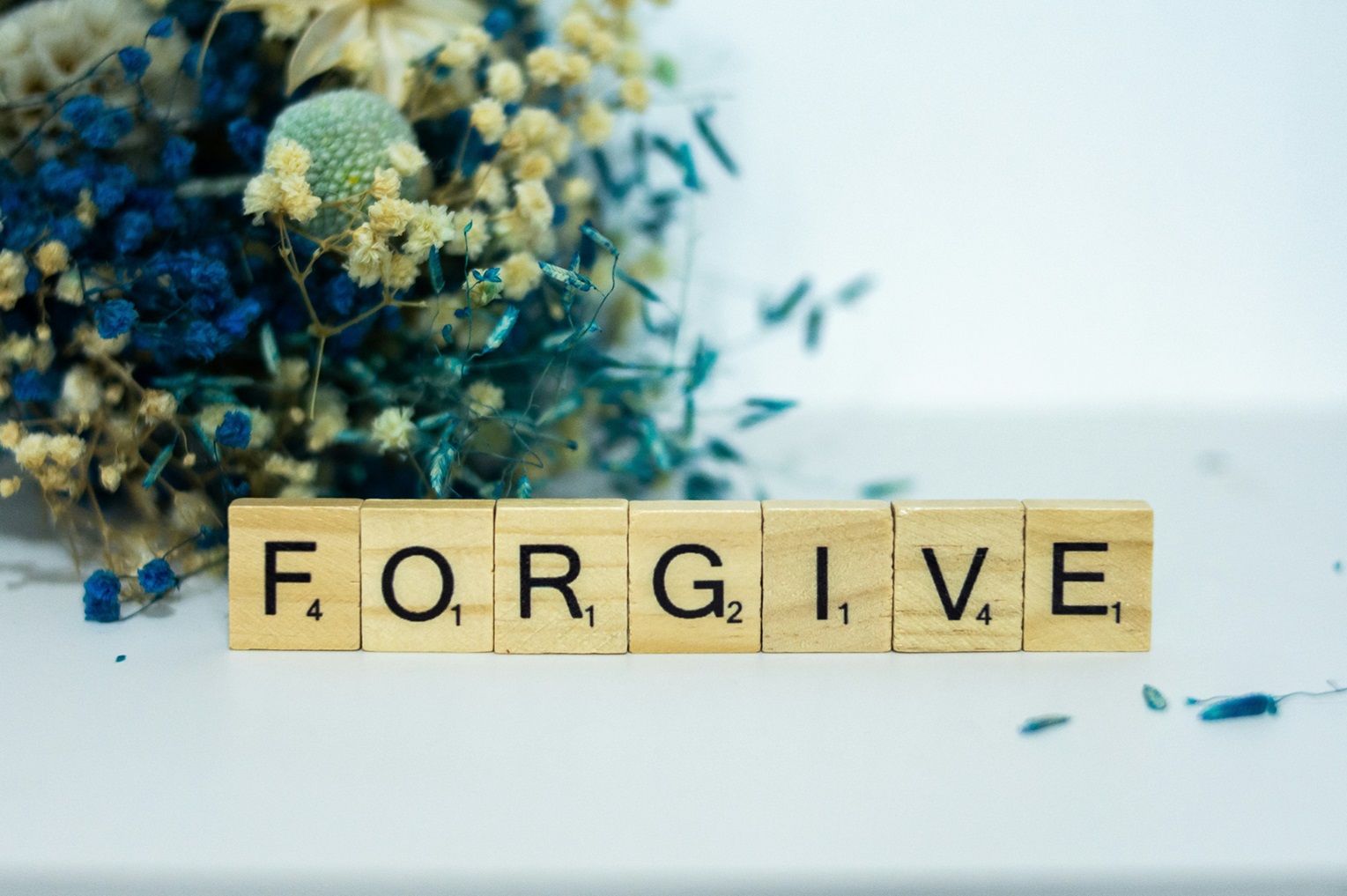
Forgiveness. It is one of those words that seems to effortlessly fit into many conversations. It’s a concept that sounds good in theory but is often excruciatingly hard to practice. Leaders of religious institutions, psychologists, even palm readers—you hear them talk about forgiveness all the time. Goodness, it seems like everyone has it on their lips.
But why is forgiveness so difficult? And why do some people who say they have forgiven still hold on to resentment and offense?
I’ll answer that in a bit, but first, let me share my story.
When I was 6 years old, I had my first encounter with evil. It started in a place much of the world would not normally think of. It was a Sunday morning, and just as we had done every week, the children would be sent to the back of the church after worship service, right before the preacher began his sermon.
We would be in kids church learning memory verses, Bible stories, and playing games. This specific Sunday was unlike all the others. Our 16-year-old Sunday school teacher pulled me aside and started to molest me right in the place I thought was the best and safest place in the world. I literally had no understanding of what was going on, only that this was not right.

I left that place traumatized and afraid as I replayed the threats of being killed if I told anyone. What a burden for a 6-year-old child to bear. I had thought that would have been the only instance, but boy was I wrong! Every Sunday became a living nightmare for me. Right when the pastor would gather the children to pray over us and then dismiss us to kid’s church, I would get antsy and sick to my stomach. Things got worse when I witnessed this same Sunday school teacher take my 3-year-old sister and do the same to her that she had done to me. I did not know what to do. This was the beginning of my many long-lived abuses and traumatic experiences.
My parents were immigrants to the United States and, just like every immigrant family, they had held on to the American dream to get out of poverty and provide their children with what they did not have, along with sending financial support for their extended families back home. To acquire this dream, my parents both worked two jobs with long shifts. So, they needed childcare. My parents had asked a church member to care for us while they worked, and you would not believe it! The church member was the mother of the Sunday school teacher. I know, you’re probably asking, could things get any worse? Yes, things got much worse. The Sunday school teacher’s mother was a full-blown undercover lesbian, and the first day we were there, she molested me and my 3-year-old sister.
Then she locked me in the garage and left me in there alone until nightfall. About 30-40 minutes before my parents would pick us up, she would come get me out of the garage, make me lay flat on the floor, and step on me. She was a very heavy woman, and she would say if I dared to say anything to anyone, she would step on me and crush me. Then she would send me inside to wash my face and put a big bowl of cereal in front of me and some cartoons on the TV so that when my parents walked in, they would see and believe that I was well taken care of.

Monday through Friday, this was a daily ritual: the abuse, the stepping on me, the threats, the bowl of cereal, and the cartoons. Then on Sunday, I had to deal with her daughter at church. As a child, Saturday seemed to be the devil’s only day off.
This lasted until I was about 8 years old. Things had gotten worse from here. In my household, I was the outcast child. I had a very strenuous relationship with my parents, especially my mother. I don’t think she ever knew how to attach herself; it was very strange. I would get clothed with nice clothes, well-fed, well-groomed, but my mother was very detached. I would often feel like it was a fight for survival because my parents had a favorite child, and I would often get the worse treatment. If you have ever heard of Cinderella, you’ve got the right idea of my life at home! It was just a horrendous nightmare.
When I turned 10 years old, there was this man named James living in our home. This man had been a leader at the church my family attended. But this man was evil. He would call me to lecture me about purity and righteousness, but in his heart and mind was nothing but perversion. This man started to molest me and would use scripture to control me. He would threaten me, slap me, punch me, kick me, traumatize me with knives, and the worst kinds of mental tyranny.

This man lived with us until I was 14 years old. One day this man was home alone as I came home from school, and when I entered the house, he tried to rape me. I ran as fast as I could, opened the back door, ran down the deck, and a big piece of wood got lodged deep into my left hand. I still have the hole to this day. I ran to the neighbor’s house, and the neighbor helped me call the police. The police got to my house, and the neighbor took me back to the house. When I got inside, James had told the police a big lie, and I froze because I was caught off guard. The police threatened to take me to juvenile detention. No one could help me. No one wanted to.
I was angry. I was angry with my parents because they did not protect me. I hated church people because all I could see was hypocrisy, sexual perversion, and fake holiness. All I had was Yah. Of course, at that time, I did not know him by his true Name. What I did know was that I had a heavenly Father who loved me and was not the reason why all these people treated me so treacherously. I knew he was there for me. I knew he cared, and I had determined in my life to never let these wicked people make me act out in bitterness, wrath, lawlessness, and self-pity/victimization.

Now that I’ve told you a little, and yes, it is only a little of my life, I want to get to the main point. Even though I had determined in my mind and heart to not let these things rule me, I had lived in unforgiveness, and it controlled me. I was angry, but not the way you’d think. It was a deep-buried anger and was like a burning hot fire in my chest, a burning that could be felt. All my feelings had been buried. I had never acted out in anger.
I never took vengeance for myself. I always acted kind, but I was hurt. The wound ran deep. I never received an apology and I often had to face those who caused me much harm daily and be the one to submit because I wanted to keep peace. The offenses and unforgiveness affected me in other ways.

At the beginning of my marriage, things were going well until maybe about a year and a half in. The trauma had resurfaced, and my husband became my punching bag. I had always felt that he had wanted to hurt me just like everyone else did. I thought he wanted to use me, manipulate me, take advantage of me, and abandon me. When he would make a mistake, I would get angry, and everything I went through would resurface, and I would mentally place him in the same category as everyone else. I wanted to be alone. I wanted him to tell me the truth and confess that he was just as wicked as everyone else. But that never happened.
He was patient. I had gotten tired of feeling like everyone was against me, so I had to deal with the issue upfront. I went to the only one I’ve ever had and knew would never betray me. I sat down and I spoke with Yah. I told him I was tired. I was so tired of always fighting (in my heart) with my husband. I told him I don’t know why I felt like I hated him even though I knew he was a good man. I told him I was tired of crying every night and had to hide my pain. I felt heightened rage when he would offend me and speak to me without considering my feelings. I spoke to my Father plainly. Please read and understand this part.

The Father had led me out of the church. And I started reading the Bible from beginning to end. I had seen how much Yah loved the Israelites and how they would abuse His love and favor. I saw how they whored after other deities, how they made vows and broke them. I saw how the Father always planned good things for His children and how they were ungrateful. I saw how the Father sent prophets and judges, knowing that the people were stiff-necked and would not turn. I saw the Father’s patience. BUT when I saw the Father’s forgiveness.
I thought to myself, “WHAT??? Look at this Mighty El! He is sovereign, he is qodesh, he could destroy these people in an instant. With just a thought, he could obliterate everyone. Yet he says this:

“From the days of your fathers, you have turned aside from My laws and did not guard them. Turn back to Me and I shall turn back to you,” said YHWH of hosts… Malachi 3:7
And you shall say to them thus said YHWH of hosts turn back to me declares YHWH of hosts and I shall turn back to you declares YHWH of hosts Zachariah 1:3
“Remember these matters, O Ya’aqob, and Yisra’el, for you are My servant! I have formed you, you are my servant o Yisra’el, do not forget Me! I shall wipe out your transgressions like a cloud and your sins like a mist return to me for I shall redeem you” Isaiah 44:21-22
Yet even now, declares YHWH, turn to Me with all your heart, and with fasting, and with weeping, and with mourning.” And tear your heart and not your garments, and turn back to YHWH your Elohim, for he is compassionate, patient, and of great loving-commitment, and He shall relent concerning the evil.” Joel 2:12-13
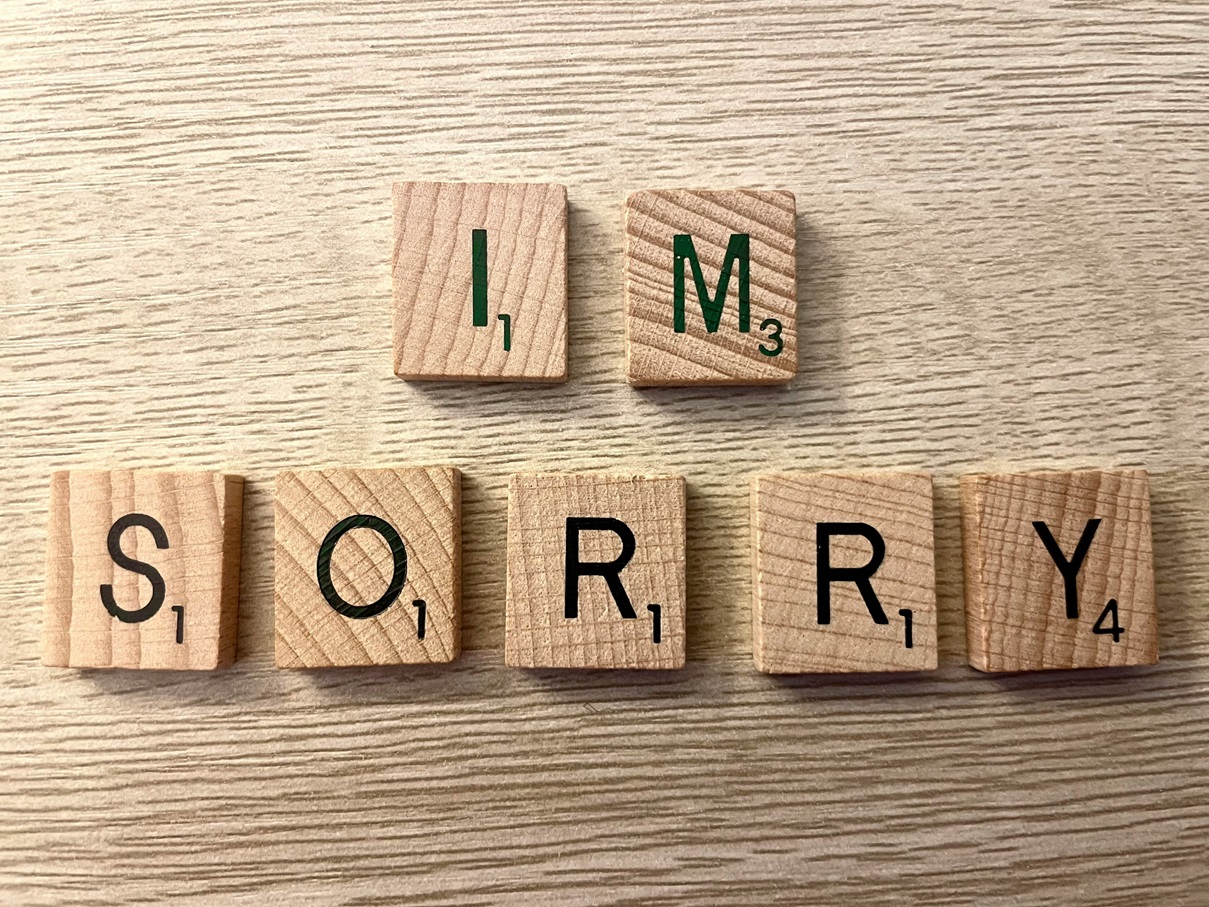
How could I hold on to offense when YHWH Almighty had so much patience and was quick to forgive a people who broke His Laws and Commands? A people who continuously committed abominations. What’s more! Yah turned back his wrath even though he knew perfectly well the people were not sincere. I was convicted in my heart. I was broken and felt that I had placed myself above the FATHER. All this time I thought, what about me? why would people do this to me? how could they treat me this way? They do not deserve my forgiveness. As if my forgiveness was greater than the Father’s. How filthy I felt. A slave to pride, offense, and unforgiveness, and this was the reason I could never be free. I did not have the Father’s heart. I had made myself and my feelings idols, and I felt abominable.
As I continued to read the Word and study the Torah, I gained a deeper understanding of the nature of YHWH. He is qodesh and He is forgiving. None of my sins were forgiven because I did not forgive, even though I thought I did because I never acted out in wickedness towards those who hurt me. I was condemned. I was an enemy of YHWH because I had no forgiveness. I was in rebellion, and the enemy had taken hold of my home, marriage, and peace.

When I sincerely forgave, that burning in my heart had been vanquished. All those tears were dried. All that sorrow turned to joy. All that filth I felt on occasion was washed, and I was given a white garment. My husband’s tone and forgetfulness didn’t hurt anymore because I understood he was a man, and he could not baby my trauma. I was not some important thing that needed to be treated like royalty or else I’ll explode.
Instead of feeling anger towards those who did me wrong I prayed to Father and pled on their behalf that they would repent and come to the love of the truth so that their souls would be saved.
My wounds were healed, and I loved the Father all the more because I understood Him, and he gave me a heart of flesh. He made me sensitive to my own nature and made me despise sin. He made me more patient and desire more qodeshah.

Dear reader, this is my plea. Please do not hold on to unforgiveness. If I had held on to the bitterness, I promised I’d never hold on to and died, I would not have made it into the kingdom. Unforgiveness is poison. It is a venomous slow killer. You don’t know its eating away at your soul until you are slowly dying in despair and completely disconnected from the Father. It will keep you a slave and it will bring forth seeds of corruption, strife, bickering, gossip, hatred and pride!!! Oh, the pride!!!
And then the fall. If you have an offense/unforgiveness, forgive, and if you have offended, repent. Walk in the love of YHWH. Follow after the Savior. There is no time to hold on to past and current offenses. What are you telling the Father? That you are greater than Him? That He can forgive but you don’t have to because your feelings and your standards are greater than His? It is a dangerous way to live and think.
Choose you this day whom you will serve! Choose YHWH the giver of good fruits. If you love Him, keep his Commands and they are all good. Even this one:
“For if you forgive men their trespasses, your Father of the shamayim shall also forgive you. But if you do not forgive men their trespasses, neither shall your Father forgive your trespasses.”
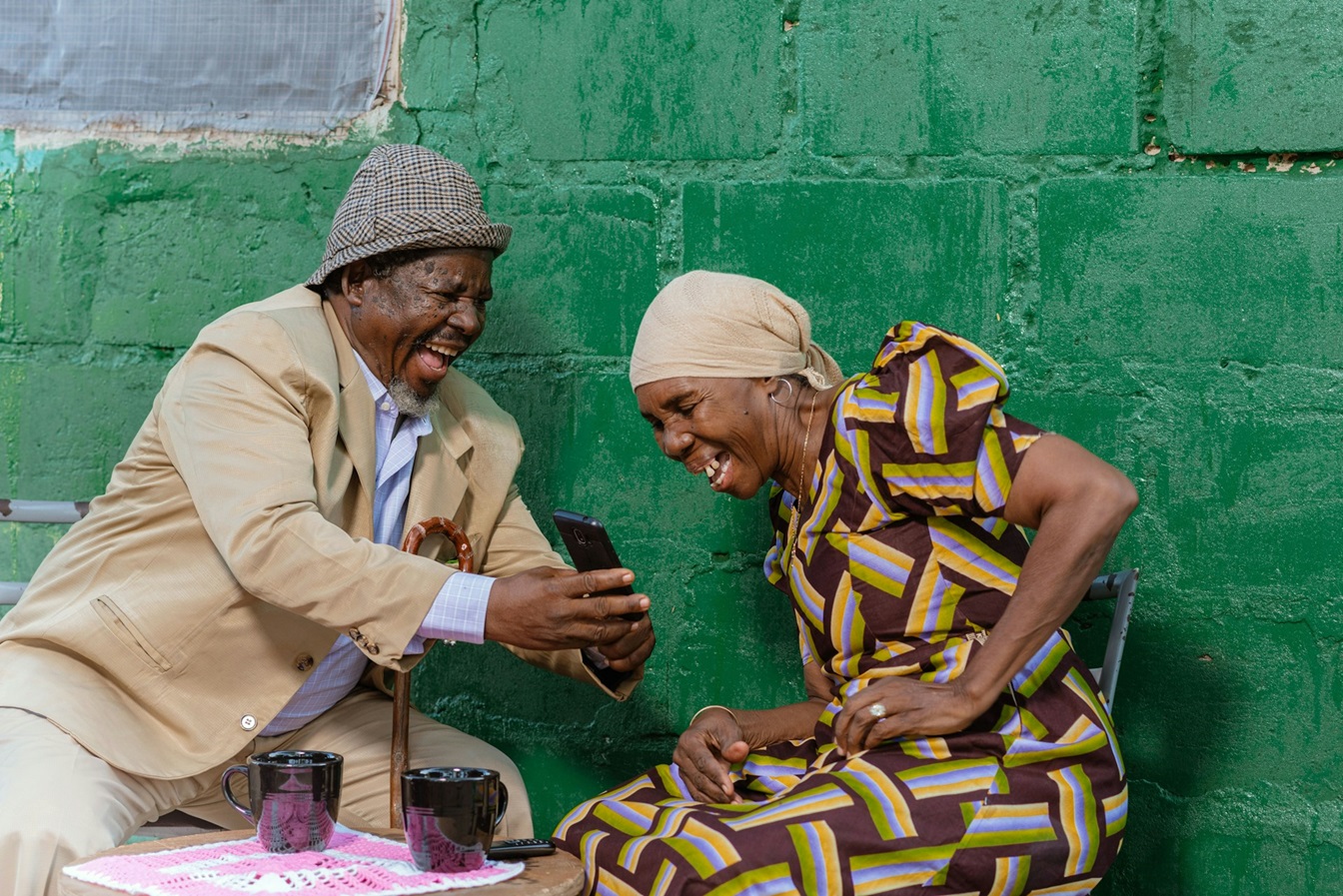
Remember that the person you are not forgiving is controlling your life and it is an idol unto you. No matter what a person has done to you forgive them and hand it over to the Father if you want to be forgiven and have His peace.
.Also, it is important to read Jerm/Yirm 6 to 9 and take note of the situation at this time, this is upon us once again and serves as a warning to us all.
Forgive and repent before it is to late as sudden destruction is coming fast upon this world, and we will need the Father to get us through this time of hardship. It is not a time of joy and gladness but much weeping and regret.
“Woe to you who are longing for the day of YHWH! What does the day of YHWH mean to you? It is darkness, and not light.” (Amo 5:18)
We pray you find peace to forgive and hand it to the Father who has shown us much favor.

Thank you for taking the time to read this important message that will change your life.
”And whenever you stand praying, if you hold whatever against anyone, forgive, so that your Father in the shamayim shall also forgive you your trespasses. But if you do not forgive, neither shall your Father in the shamayim forgive your trespasses.” (Mark 11:25-26)
The HalleluYah Scriptures Team

